PHOTO FEATURE Refugees: a journey through Serbia

It’s Monday. After a six hours’ drive, I get to the border. The customs officer has me open the trunk, asks me where I am headed to and bursts out laughing when I tell him about the Belgrade refugees. I am puzzled by his reaction, still he waves at me to keep going.
The Serbian customs officer, on the other hand, is in no mood for jokes, he gives me a serious look, straight into my eyes, for half a minute or so. I suddenly feel guilty and try not to blink, he might just allow me to go on. He wins though, I am the first one to blink. I expect he’ll order me to take everything out of the car, but he suddenly turns his back at me without another word. I mumble a very timid „can I go now?” , but no answer comes, so I cautiously drive on.
Three hours later I am in front of a Belgrade park. I barely come out of the car and a 14-15 years old teenager asks me: ” Excuse me, sir, do you know where I can buy some bread?”. We start talking and I and find out he is lodged at the nearby hostel with his family. His name is Menaf. I ask for his phone number, he tells me the Syrian number cannot be reached internationally, so we decide to communicate over WhatsApp.
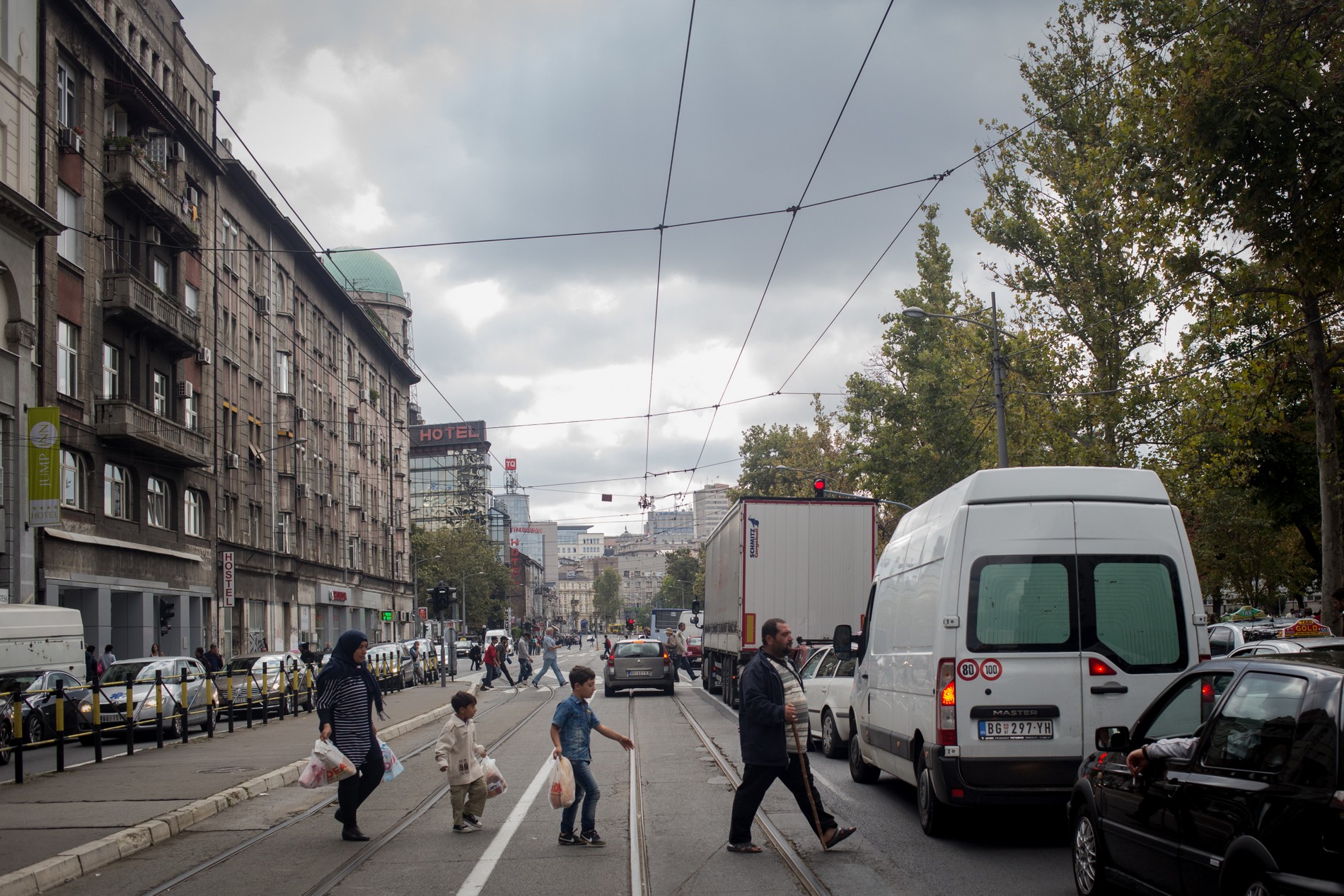
I cross the street and enter the park. It’s already dark outside, and quite a disarray, everything’s very impressive, all senses are jump-started, everything’s colourful , strong smells and sounds. Garbage trucks empty the full garbage containers, huge queues are at the toilets set up by the authorities, I see two-three police patrols marching calmly in the park, children play, adults get ready to sleep . Some have tents, a few dozens, I think, others will sleep on benches or straight on the ground. A few are headed towards hostels. Some are coming, some are going.
Behind me, I hear someone yelling : ” four peoples only ! „, a few taxi drivers negotiate with four Syrian families, I sit for a few minutes, trying to understand what is happening. The cliches I read about unfold right before my eyes. A guy with an iPhone timidly offers candy to the children. A fair haired lady takes a blanket and some clothes out of a bag and hands them to a mother who doesn’t seem to be in desperate need. They are both a bit embarrassed , the lady speaks in Serbian, and gesticulates vividly. The woman in front of her listens, doesn’t understand a word, smiles back and ends the conversation with a shy „thank you”.
A little girl drags two smaller children along. She wears a raincoat of Cinderella and the other Disney princesses . ” If you can dream it, you can do it. ” I hope that turns out to be true, in her case. I decide to move around, it starts to get chilly. I go around the park, which is between the railway station and the bus station. I see large numbers of people waiting in lines for the buses.

On my way here, I heard Romanian president Johannis‘ statement mentioning the 1700 refugees Romania is ready to host. Not more, he stressed. Hollande also proudly said that France is ready for 24,000 people.
I think to myself that politicians, in general, have no idea what they’re talking about, their estimates seem like pure fantasy, wishful thinking. In a single day here, I was about to see more than a thousand people coming and going . The park would empty out, and then fill up again. The flow has been steady for a few weeks. The initial European plans, for 40,000 refugees have been utterly unrealistic. The additional 120,000 places agreed by the politicians will very likely have to be adjusted again.
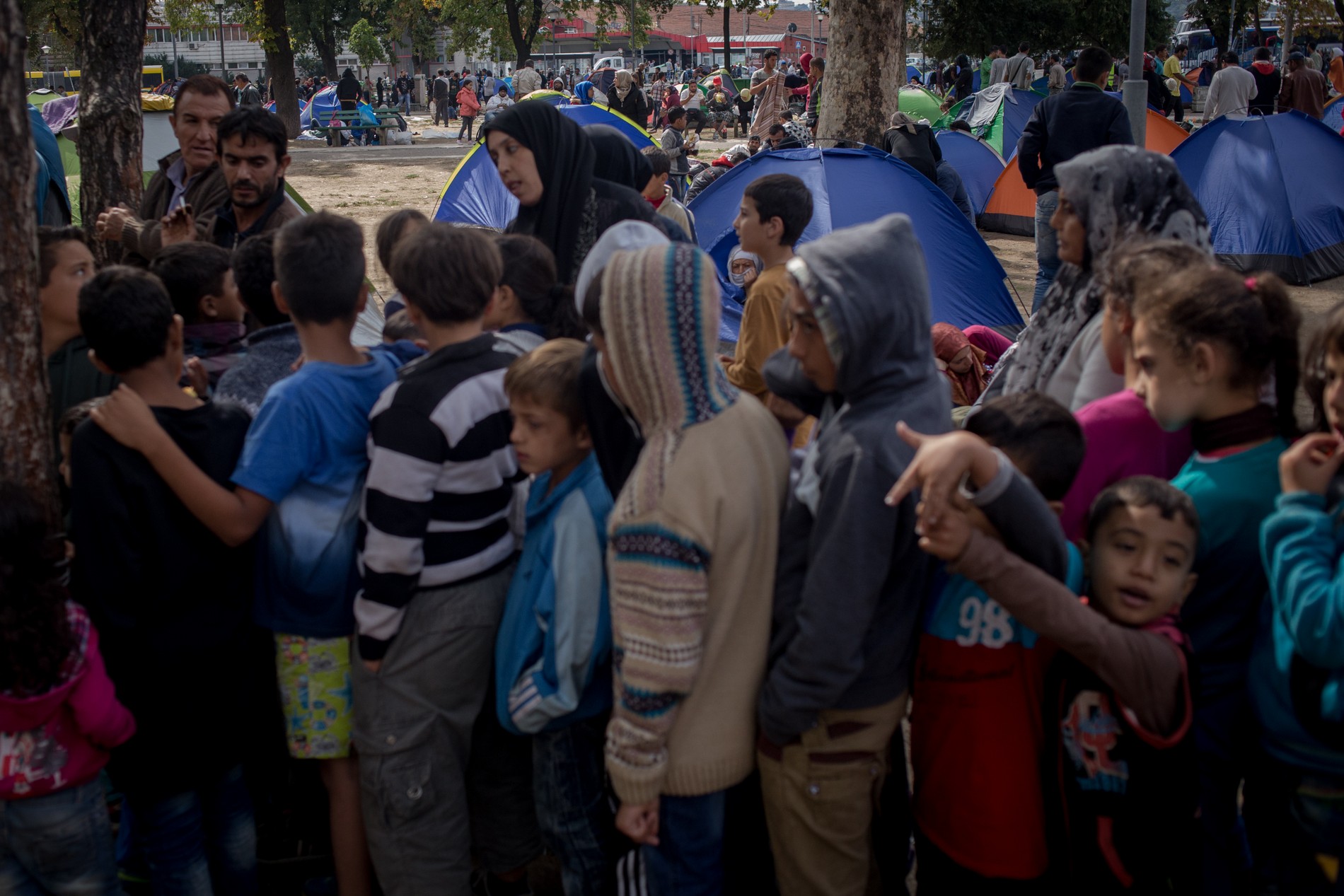
It’s Tuesday. I go to the park and start looking for someone who speaks English. I meet Ramez, who is constantly apologizing for his imperfect English. He tells me he left Syria a year and a half ago. He lived in Istanbul, without papers for a while , and then he decided to start towards Europe. He is a dental technician and wants to go to Germany to find a job there. „I don’t want their money „, he tells me, ” I just want to work and have a normal life. My family is in Syria. I talk to them every 5- 6 days. They have no electricity, no water. They wanted to draft me into the army and I ran away. I don’t want to go to war.”
Those in charge of the refugees’ transport have asked him for 2,000 euros, money he didn’t have, so he crossed the sea in five hours in a small boat. He was lucky, he made on his first attempt, others have been forced to return to the shore several times, the engines would break down. That is, if they don’t drown. He shows me the piece of paper handed to him by the policemen at the Macedonian border. It’s a simple sheet of paper, no stamps, no signatures, no picture.
„The policemen are very nice in the morning, but in a few hours time they get sick of this and they lose their patience. They just write your name on a piece of paper like this one and send you on your way.”
He’s in a hurry to leave, he heard that the Serbian police is carrying out checks and they’re sending back people with no papers.
Pretty ok guy, I think, we could have been friends. We promise to keep in touch on Facebook. I wish him good luck, a bit confused and worried about the gap between the European quotas and these people’s convictions that they would live in Germany. All of them.
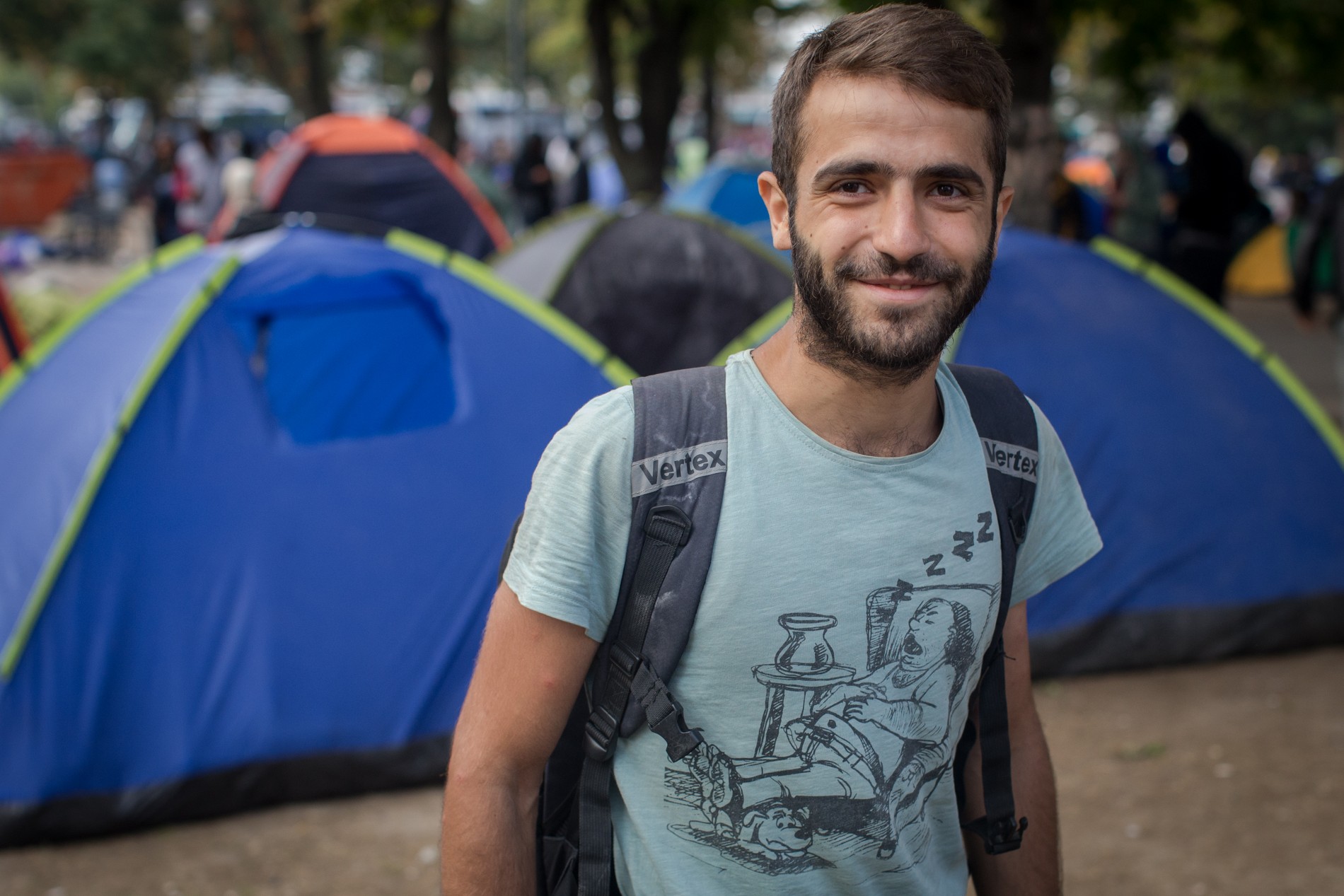
Inside the park chaos starts to resemble order. Various NGO’ s cars show up. The Medecins sans Frontieres organize people so they can give them medicine, consults, and diapers. One of the doctors tells me he came straight from Libya to help out the refugees , and then he goes back to the children in front of him.
A few meters further, two young men dressed in the blue clothes of UNICEF walk around with forms. A group from International Aid Network try to offer legal, psychological and medical consultancy to the people in the park. UNHCR , photographers and cameramen , journalists from Serbia, Italy, Bulgaria, and who knows how many other countries complete the picture.
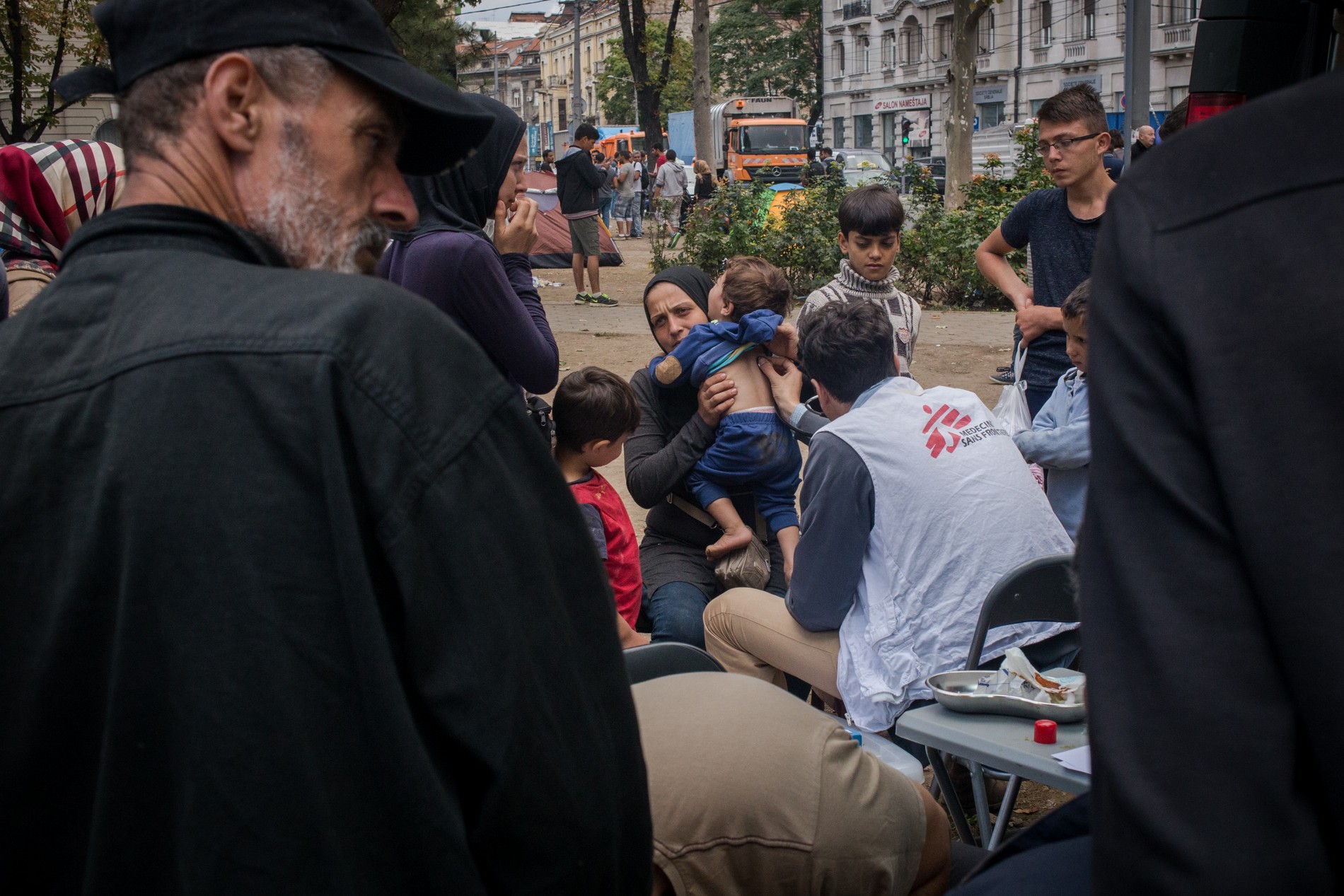
I roll around in my head all the speeches I heard back in Romania, dominated by fear and I think I am also scared of all these bearded and ultimately different men.
Lucky thing I am a bearded man myself, so I decide to listen to them. I get closer to them and the stories start to unfold. Basel Mohamed is 16 and left Syria a week ago. He tells me of his mother and sister, who are still in Syria and how they cried the day he left. His mother put the best food she could cook in his backpack. His parents had divorced a long time ago, and his father has been working in Qatar, but Basel does not have a good relationship with him. Why did he leave Syria? He tries to paint a little of the life they used to lead there, but he sums it up by saying:” a bomb here, a bomb there”.
His friend interrupts him and tells me that the police stops you on the street, looks at your ID picture and „if they don’t like it, they may take your car and money and at best then let you go”. Basel says: „and also, terrorists all over the place”. In his approximate English, „terrorists” sounds just like „tourists”.
He thinks as himself as being an atheist, he doesn’t understand the Muslims coming to Europe , but want their sharia observed, he’d like to get to England, but will probably stop in Germany. ” The bus leaves at 5 „, he tells me, ” I’ve asked the people in the park „.
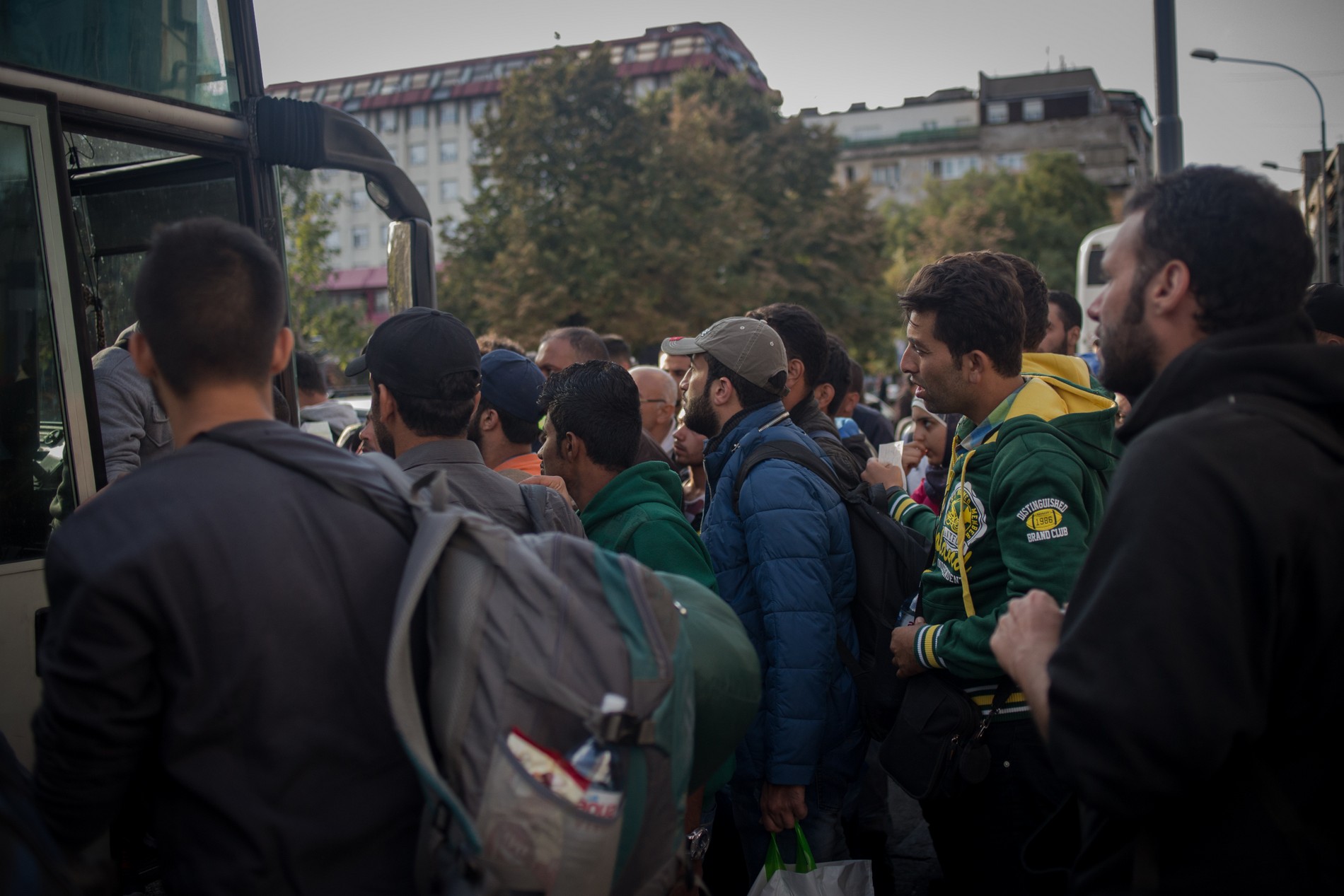
The young men are willing to tell their stories and to be photographed. Women and men with children are reluctant though. They do tell their stories, but they’re afraid to be photographed. Many of them still have relatives back in Syria, and fear the consequences if anyone should see the pictures.
” My house burned down „, one woman tells me, surrounded by three little children, ” and I am sick and tired of all the TNT boxes dropped from planes and of Daesh (ISIS) , so I left Syria for Turkey by foot, then took a little boat to Greece”.
One man recounts the hundreds of papers spread on the ground in Turkey , with the numbers of those managing the sea crossings. There are stories of immense amounts, I am not sure what to believe, are they magnifying the scale of things? Two, three, five thousand euros for a place on the boat.
Two elder women remember how they waited for a few months to raise the money.They lived near Bashar- al- Assad ‘s residence, in a relatively safe neighborhood, and they hoped things would somehow sort themselves out and the violence would stop. Three days ago they realized it was too much.
„Too many rockets, too many bullets”, they say. They already sold the house, they didn’t leave anything behind, they went looking for some peace and quiet.
They are still in shock after the voyage, they tell me they cannot forget how the Turkish police treated them like animals, and how in Macedonia they stayed for hours in the sun, waiting, children, women, elderly.
They tell of how people would not allow them to use the toilet, about the woman giving away bread solely to Christian refugees, refusing the Muslims, about Angela Merkel, „amazing woman, very very good woman”.
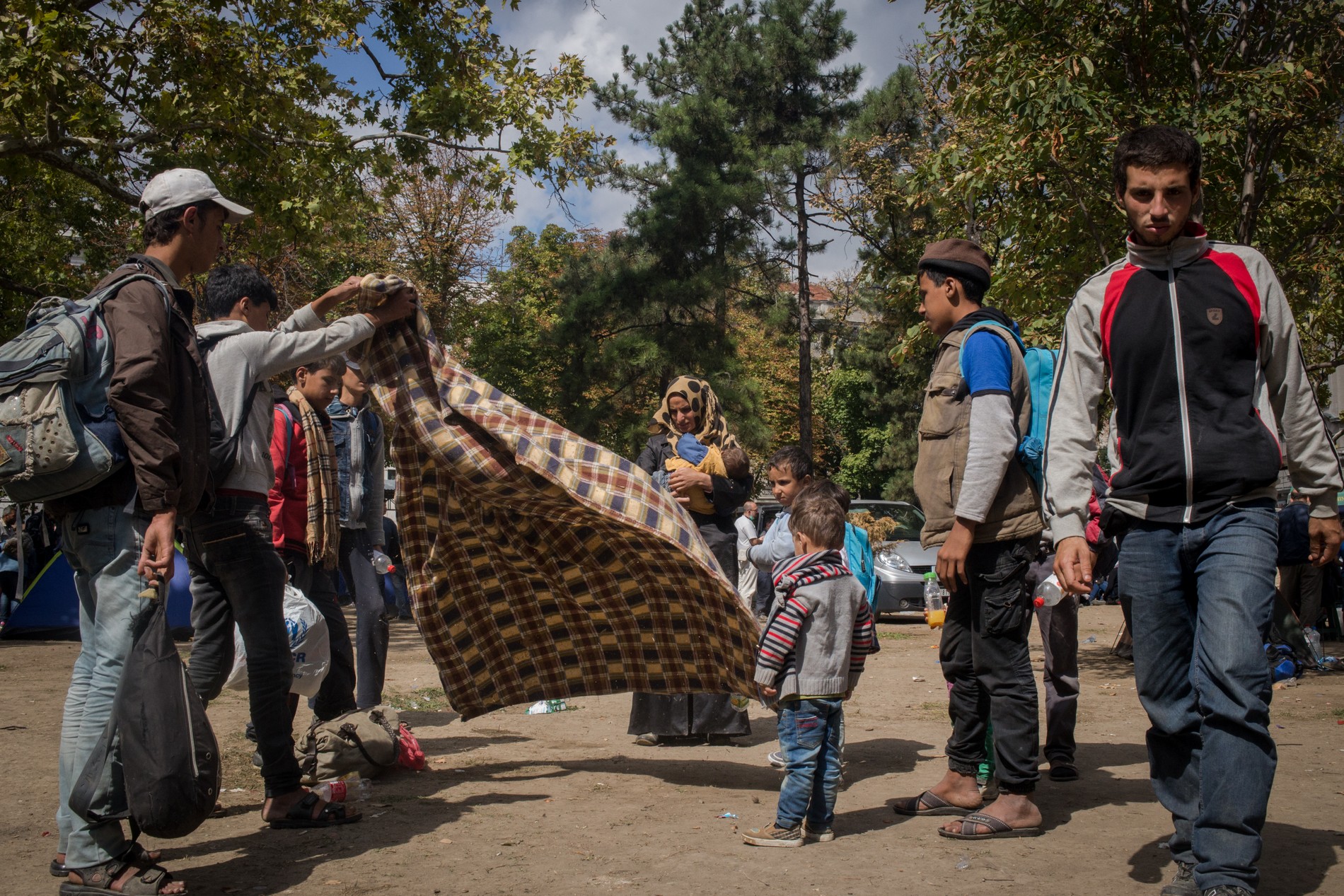
In a cafe near the park, full of refugees charging their phones, with signs in Arabic on each table (” pay in advance „), I manage to get an Internet connection and I see some messages from Menaf. He wants to see me, but his father won’t allow him to speak to me.
I only speak to him for a few minutes in front of the hostel and he keeps saying the same thing : he desperately wants to find peace. They tried to live in Turkey, but life there was too expensive. His brother stayed in Syria, because his wife was about to give birth. He thanks me for listening and hurries back to his room.
In the park, the faces keep changing, but the setting stays the same. A few sleeping bags are spread under a cross. I wonder whether there’s some kind of hidden irony, but I am distracted by three Serbian guys who set up amplifiers and start singing for the refugees. There’s a good vibe, people are laughing, dancing and they seem to be having a good time.
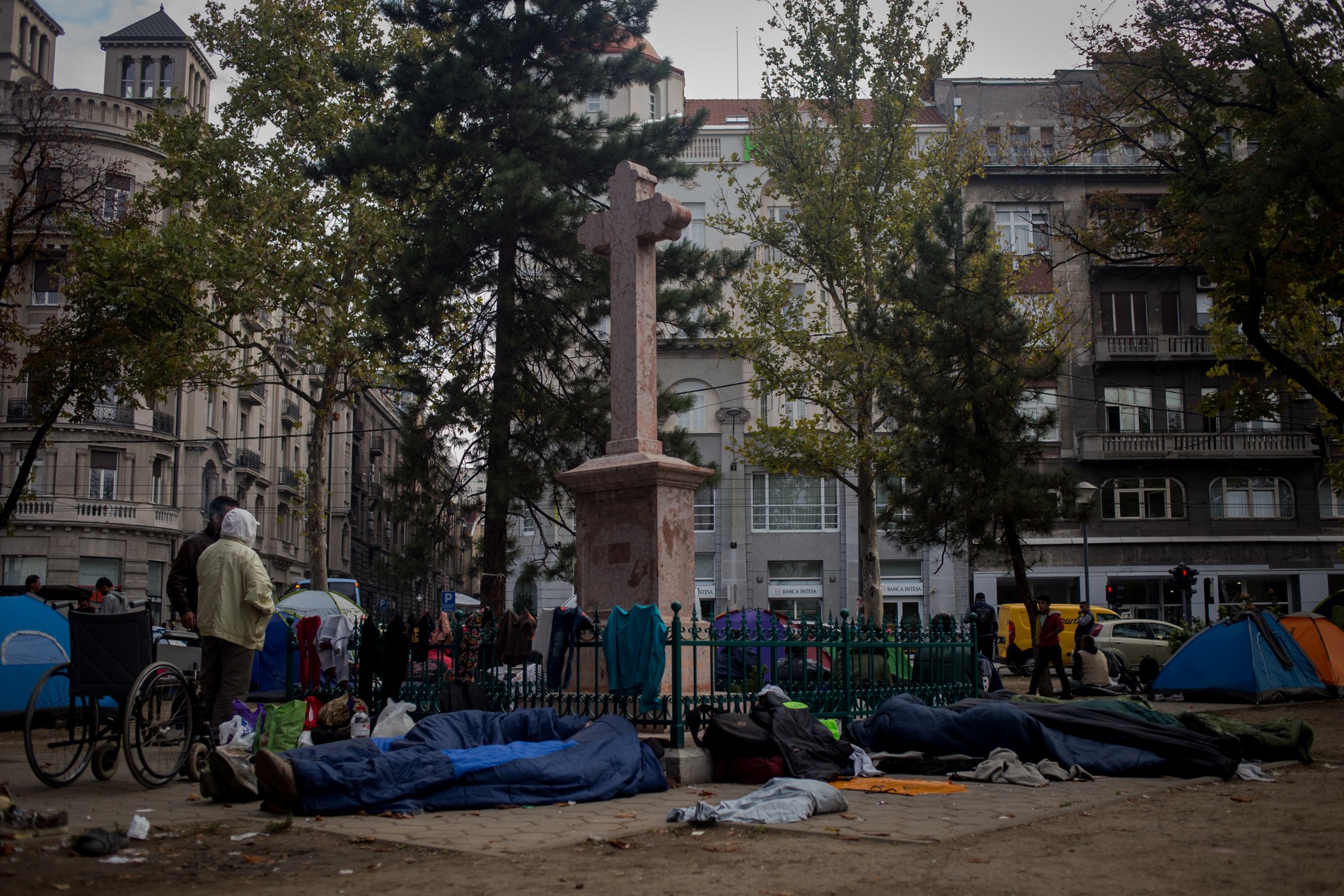
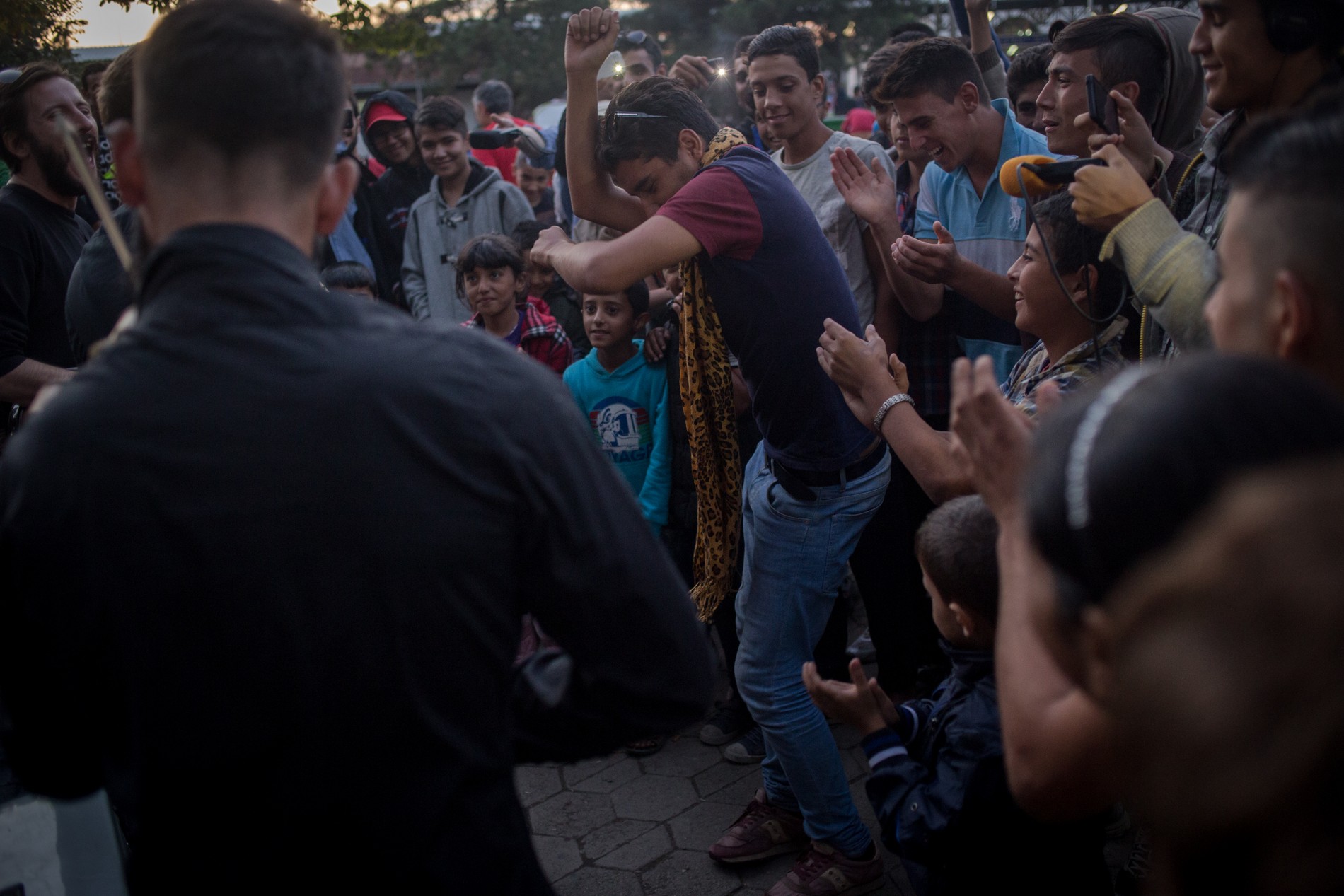
Two hours later I wait for the bus to the border with Basel’s group. A tall man , well built, inevitably bearded asks me where I am from and then repeats after me , with a distinct „R”: „Rrumania”, and then adds: „Rumania good, Hungary not good, we are prepared to run „. They all take their backpacks, tents, sleeping bags, three friends shoot a selfie. Someone brings water from the shop , they are ready, next stop – Hungary.
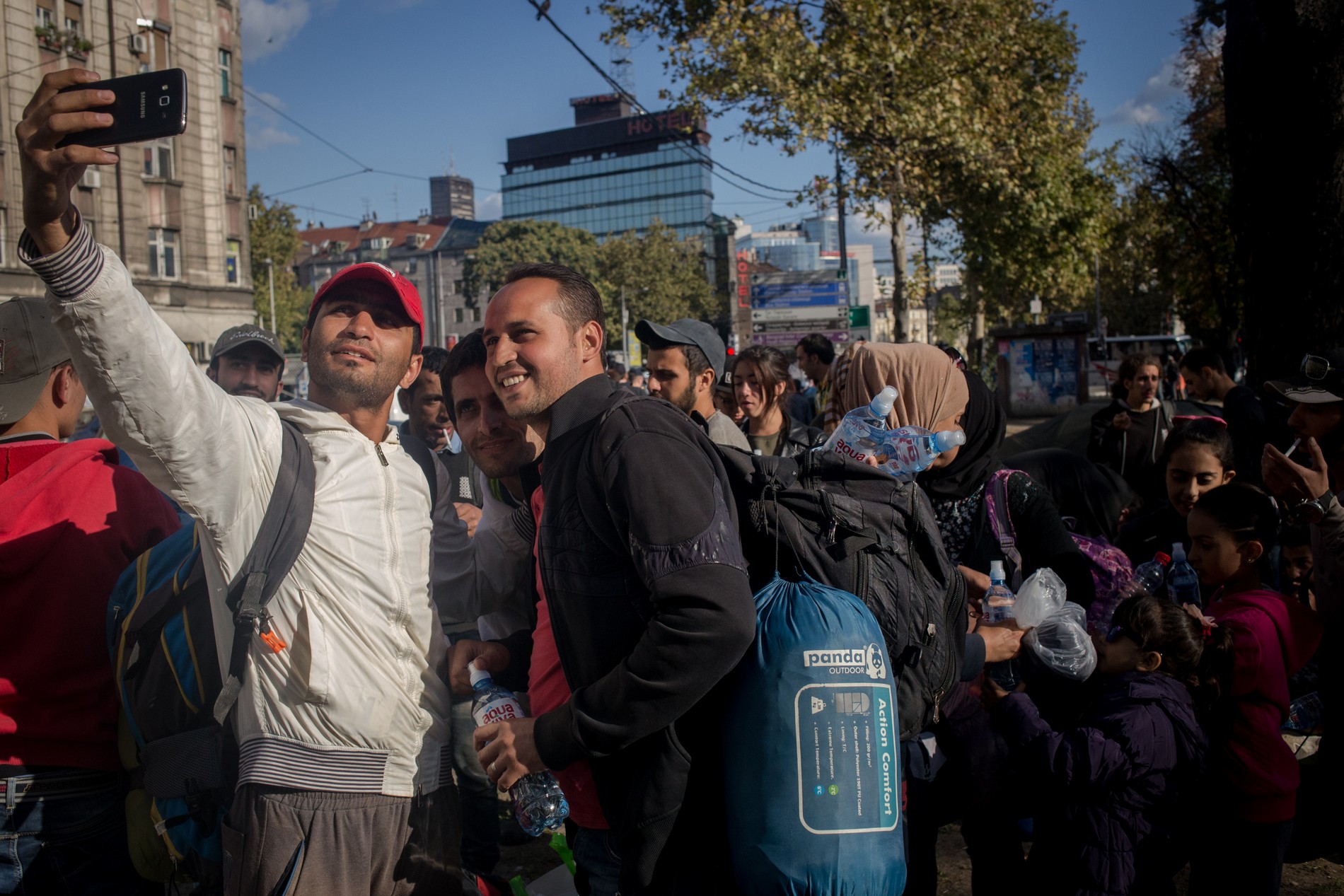
***

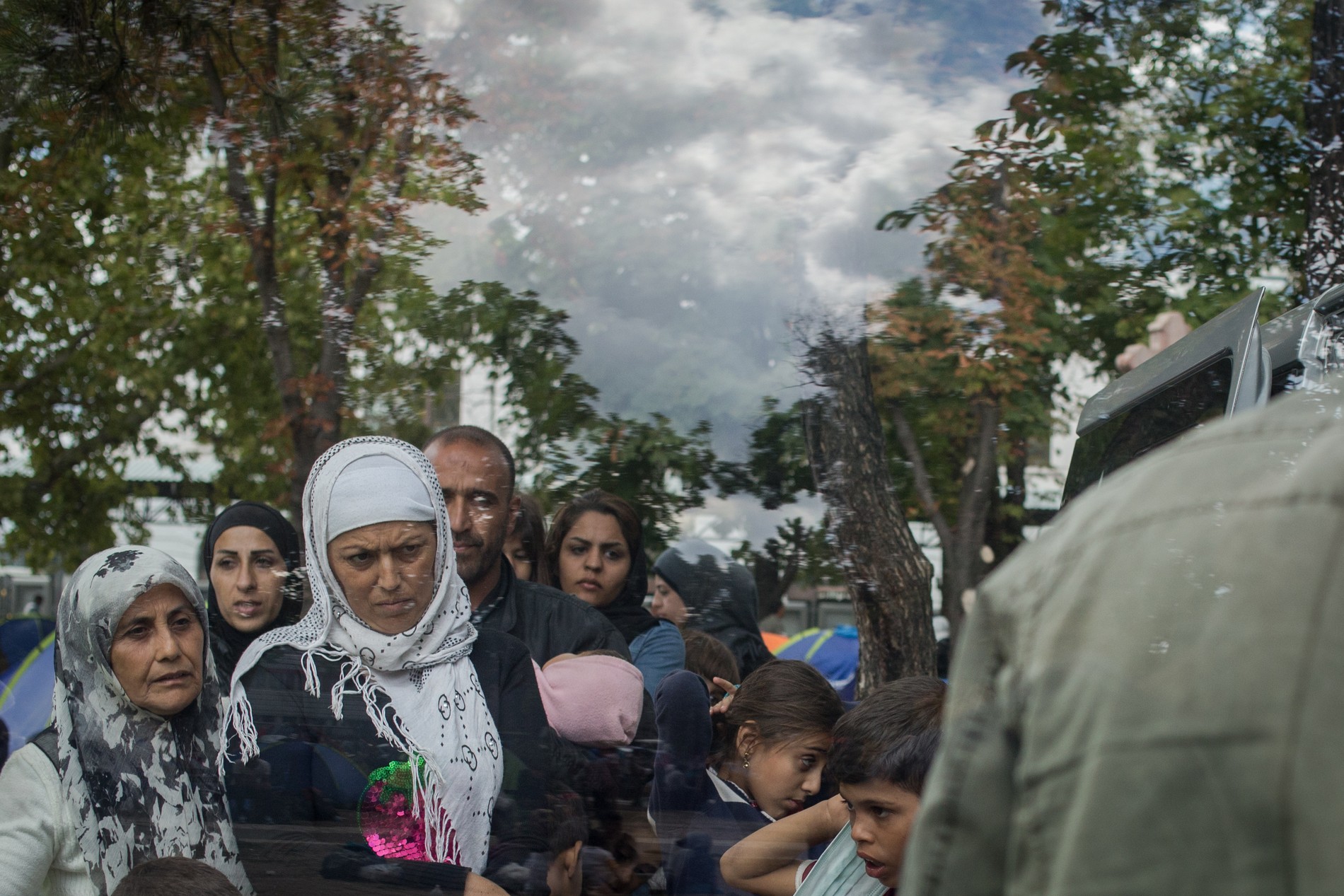



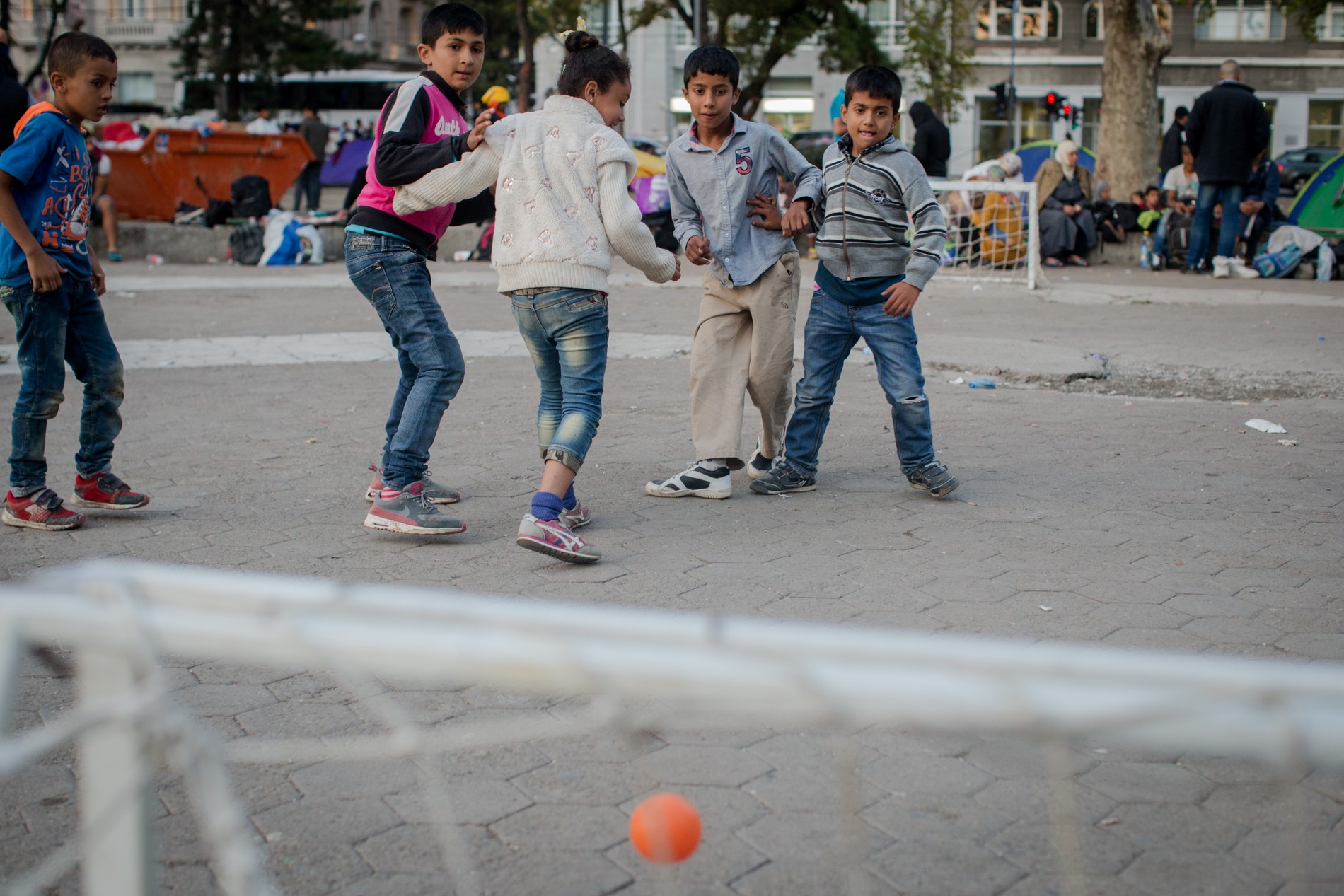
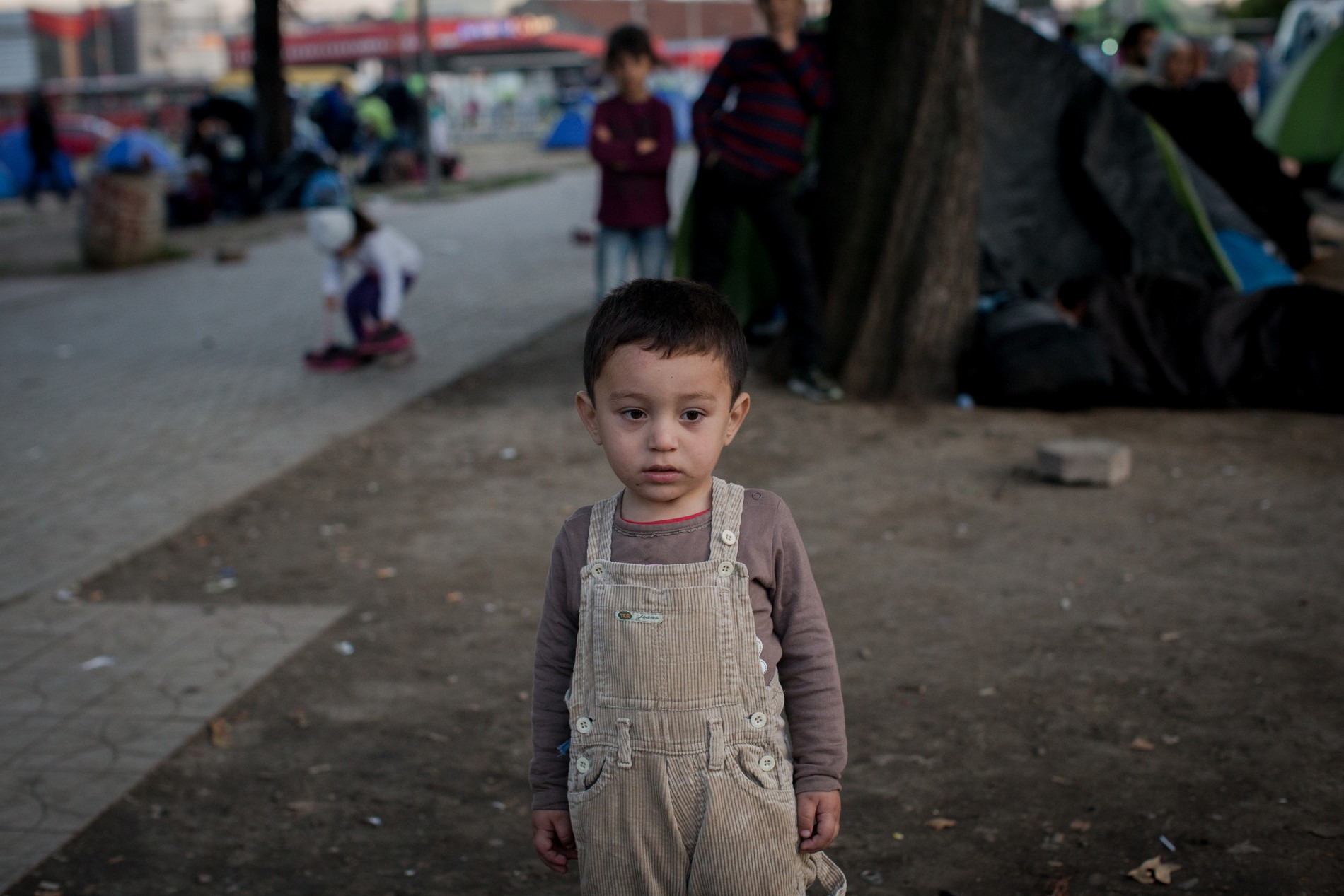
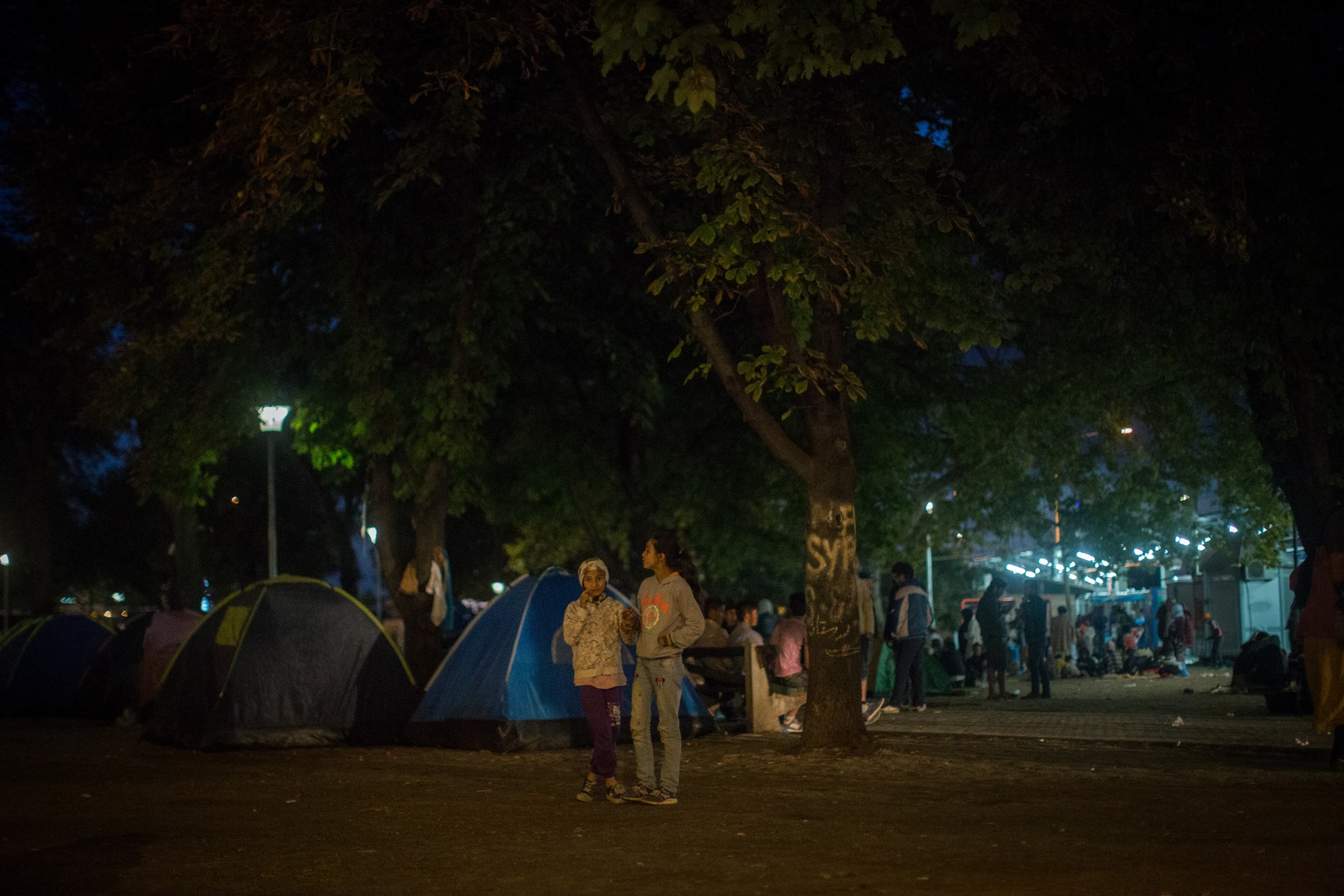
The Border
Srre is 21 and left Syria 3 years ago. He stayed in Turkey until last week, waiting for his brother and his best friend Khalil. Before the war, they used to live by the sea, so he decided to swim his way to Greece, they didn’t have enough money for the three of them to cross in a boat anyway, so he just sent his brother.
He shows me the distance on his phone display- three and a half kilometres. It doesn’t seem like such a long way, but it took him four hours to get to the shore.
The three of them are in Horgos, at the Hungarian border. They left Belgrade in the morning and this night they plan to cross the border. Alongside them, some other hundreds (or thousands ?) refugees make the same decision.
He asks me how’s the weather in Belgium, he doesn’t like rain or snow. He has friends over there, and hopes to get there as soon as possible. Budapest, Vienna, Munich, Brussels. It sounds just like the city breaks marketed by travel companies.
Buses and taxis come every fifteen minutes. They park in front of the railway station, across the police car.
Every conversation I had with the volunteers I met comes to mind; perhaps a first step would be for Europe to stop looking away, to stop forcing thousands of people to cross seas aboard sinking boats and borders in the dark, who benefits from all this madness?
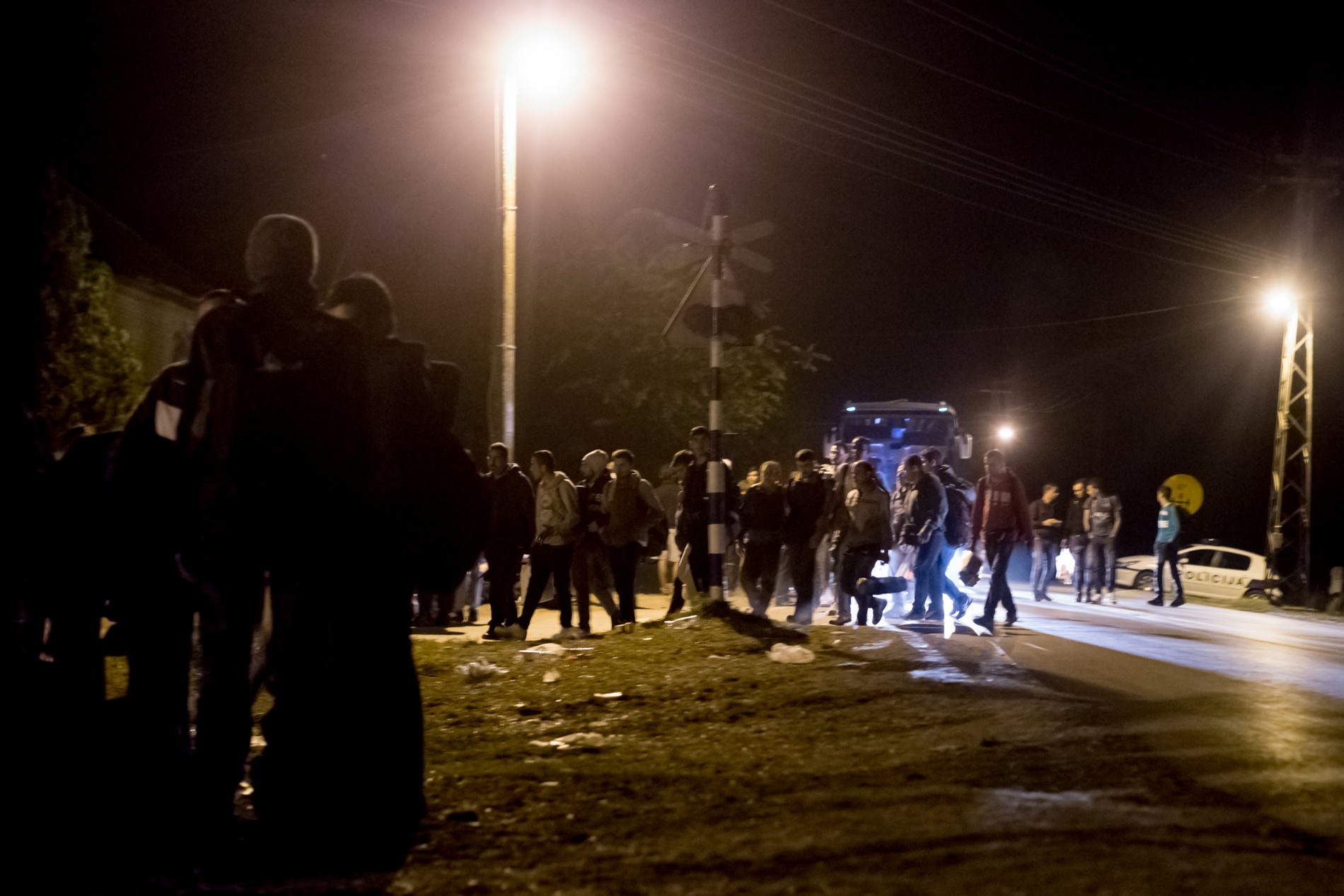
We have already been waiting for over an hour. A man speaks to me in a language I don’t understand, takes the water bottle from my hand, drinks half of it and hands it back to me.
Khalil pulls me aside and whispers: „not Syrian, Iraqi, bad people”. I look around. Some of them, the braver ones, have already left, others are still gathering up in groups, no one crosses alone.
Srre shows me a message from a friend who is already there, asking him to be careful about the traffickers, warns him not to leave with random guidance.
He is under a lot of stress, I empathize with him, I remember the decisions I was making at 21. We finally join a group of 10-12 people, children, men and women and we are on our way.
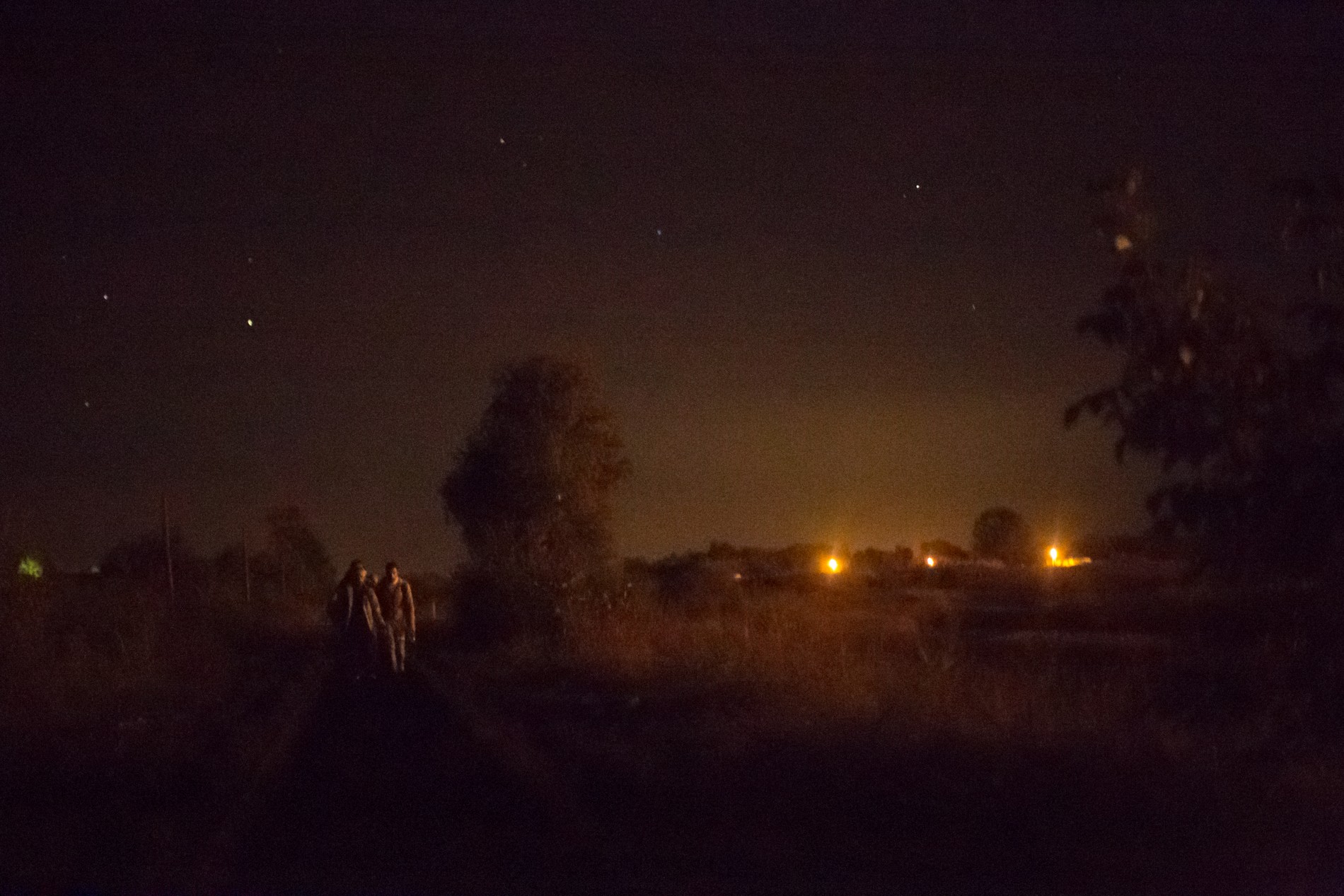
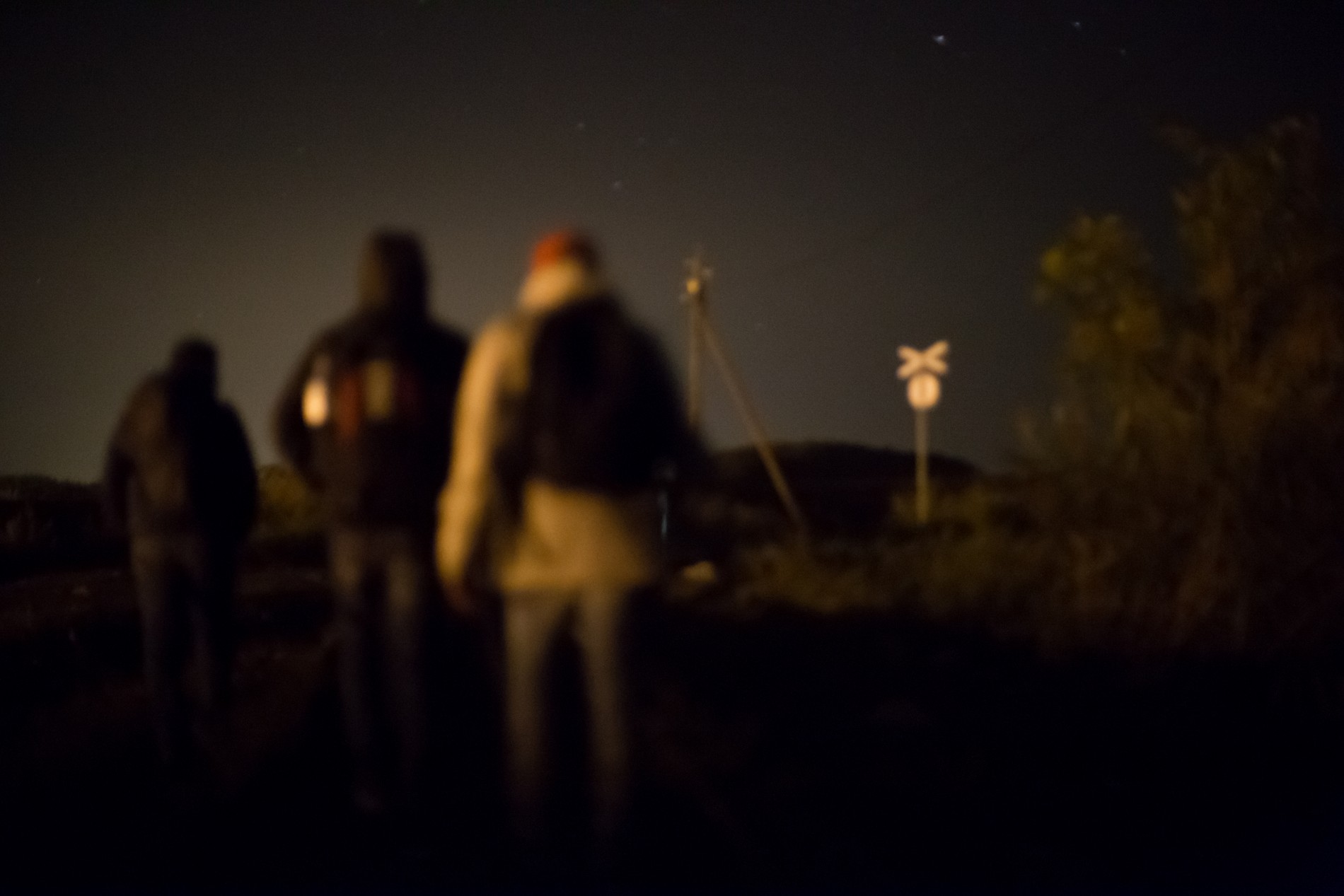
We walk a lot along the rail tracks. More groups come up from behind us, there is a lot of whispering, children don’t utter a word. I see them on their fathers’ shoulders, I ask myself what is going through their minds, what they must be thinking of this running away which decides their future, this neverending flight.

It gets darker and darker, the city lights are far behind us. We stop often, we sit on the ground, we start again.
Two men have undertaken leadership, they keep looking at their phones, they whisper to other groups, they count us whenever we stop. It all feels strange and surreal, I’m waiting for someone to show up out of nowhere and finally make me understand how we’ve got here.
Nobody comes, all I see is shadows, I merely guess the right path, we are off the rail tracks, into an orchard with perfectly aligned trees.
We step over a ditch, a few meters in front of us lie thick and tall plants, taller than us. Nettle, maybe? Fern? It doesn’t matter, I dodge, put my hood on and keep going.
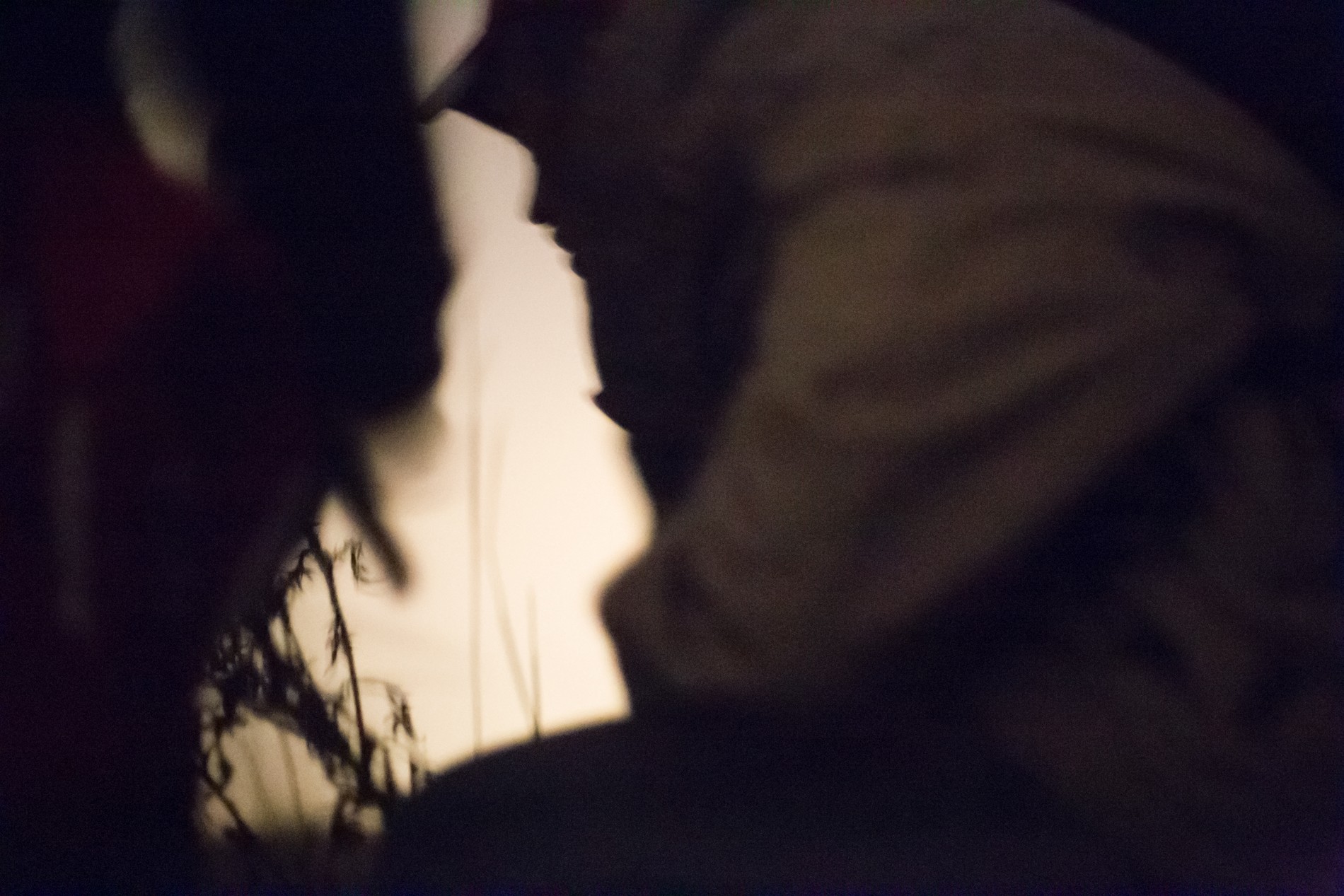

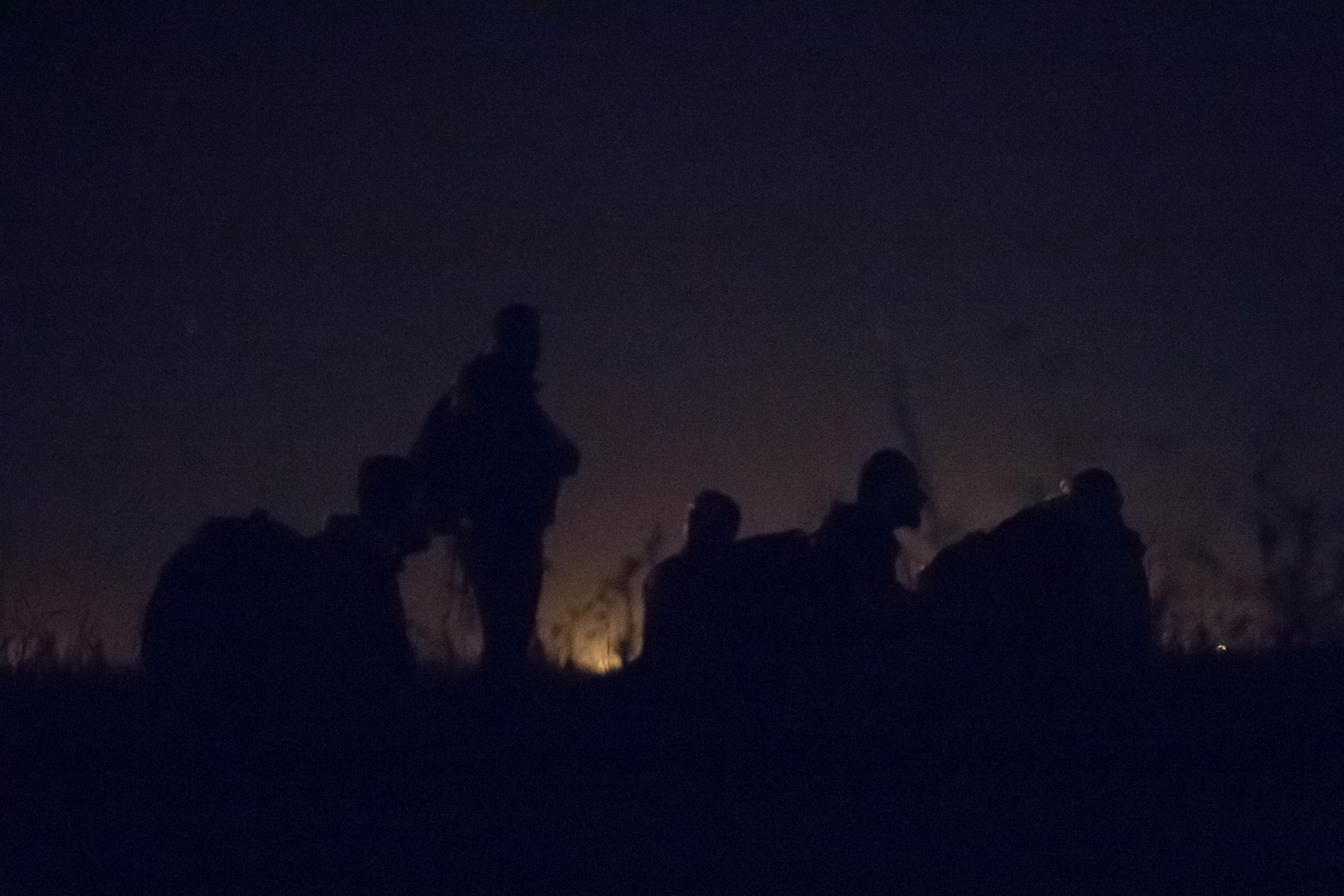
I’m cursing my out-of-battery phone and ask quietly, but nobody knows whether we’ve already arrived in Hungary or not. Half a kilometre further, it becomes clear: we are right at the border.
A Serbian police car with the lights on, two photographers are shooting continously, people are all speaking at the same time, everything is upside down, where is the climax I had been waiting for, I don’t know what to make of this informal „customs”.
I see the famous Hungarian rolls of barbed wire, some 3-400 m away the Hungarian police are lazily patrolling, a lantern or a reflector keeps revolving, apparently avoiding the refugees.
A few locals pass us by, laughing, they are probably heading home.
It feels just like The Truman Show, a big theatre production, a setting, the policemen pretend to guard us, we pretend to care and we comment on the side, we look at them and watch their adrenaline rush.
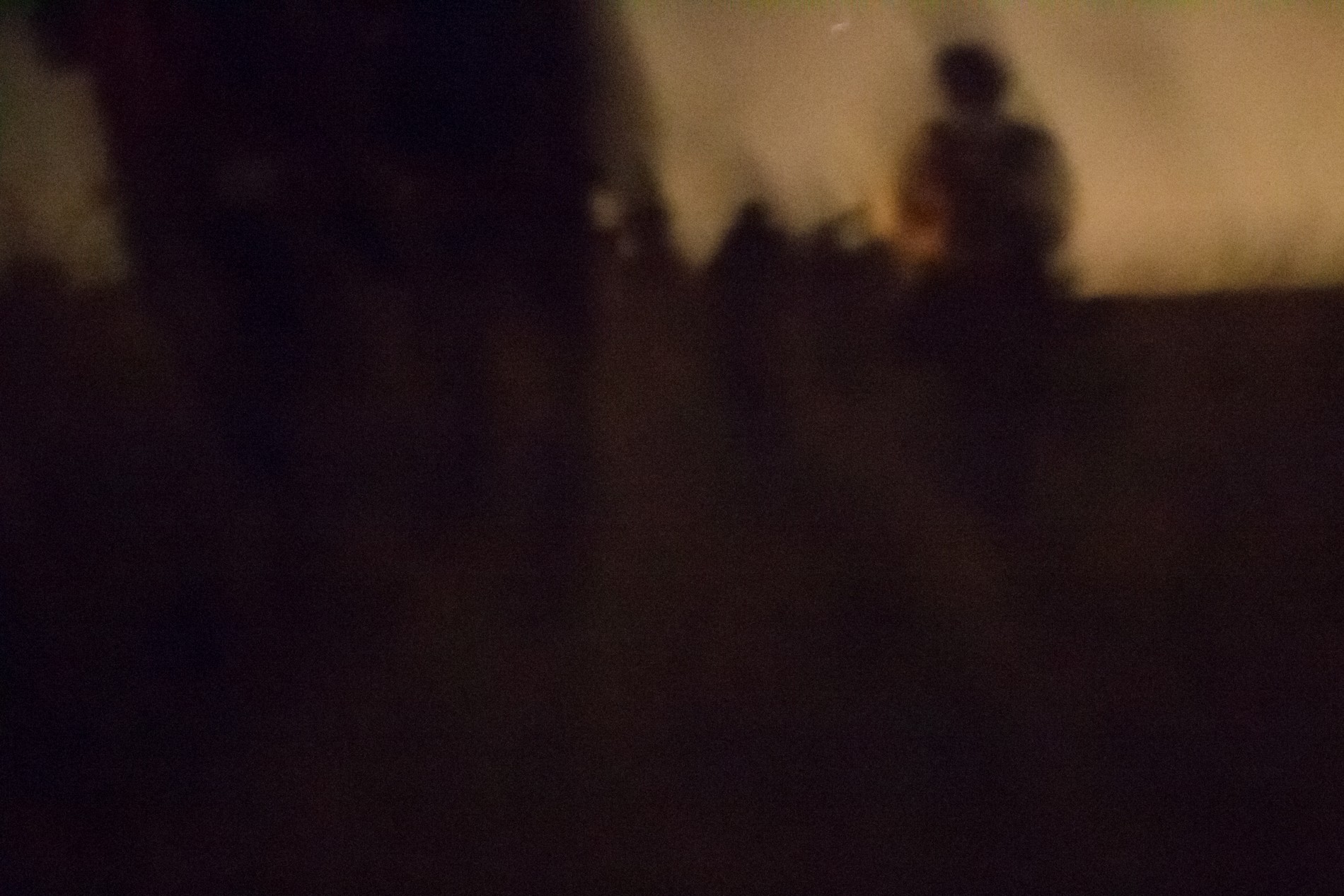
The group continues to take everything seriously, we cross the border and we start over with the sitting and standing, with the silent breaks, rail tracks, corn fields, we are in Hungary, ” the danger is not over „, Srre whispers.
Rustles are heard from the corn field, we lay on the ground again, there were just „taxi drivers”, the sort of drivers one would avoid in Bucharest, „taxi, taxi, Budapest”, Europe is busy talking, the Turkish boat drivers , Serbian and Hungarian smugglers are not, though.
First they take the refugees’ money, then they are ok with despising them.
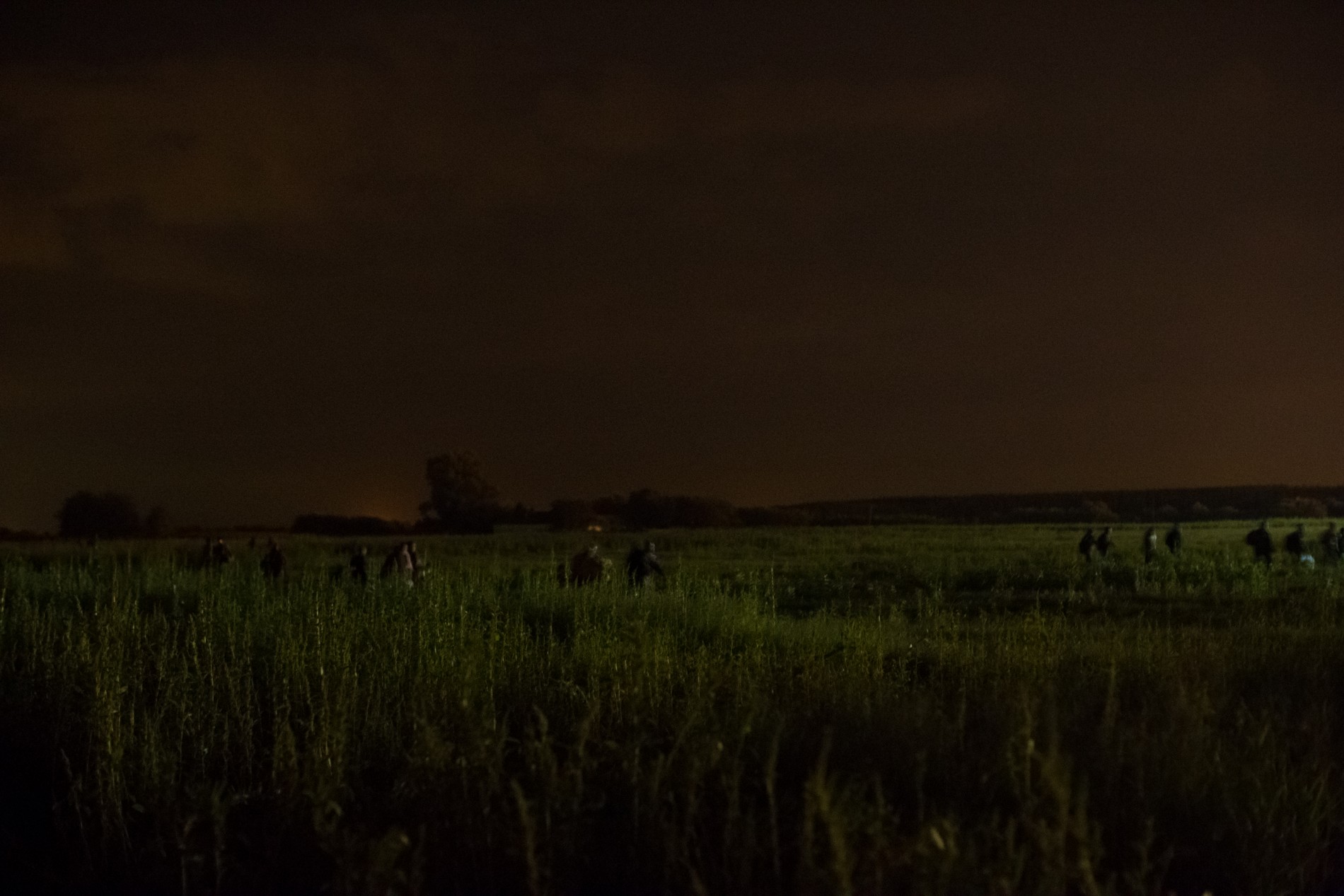

I separate from the group and remain in the field for a while, then walk to Serbia. From time to time, whispers are heard in front of me, then a few shaddows cross rapidly. Two or three more borders and they ‘ll stop. Probably.
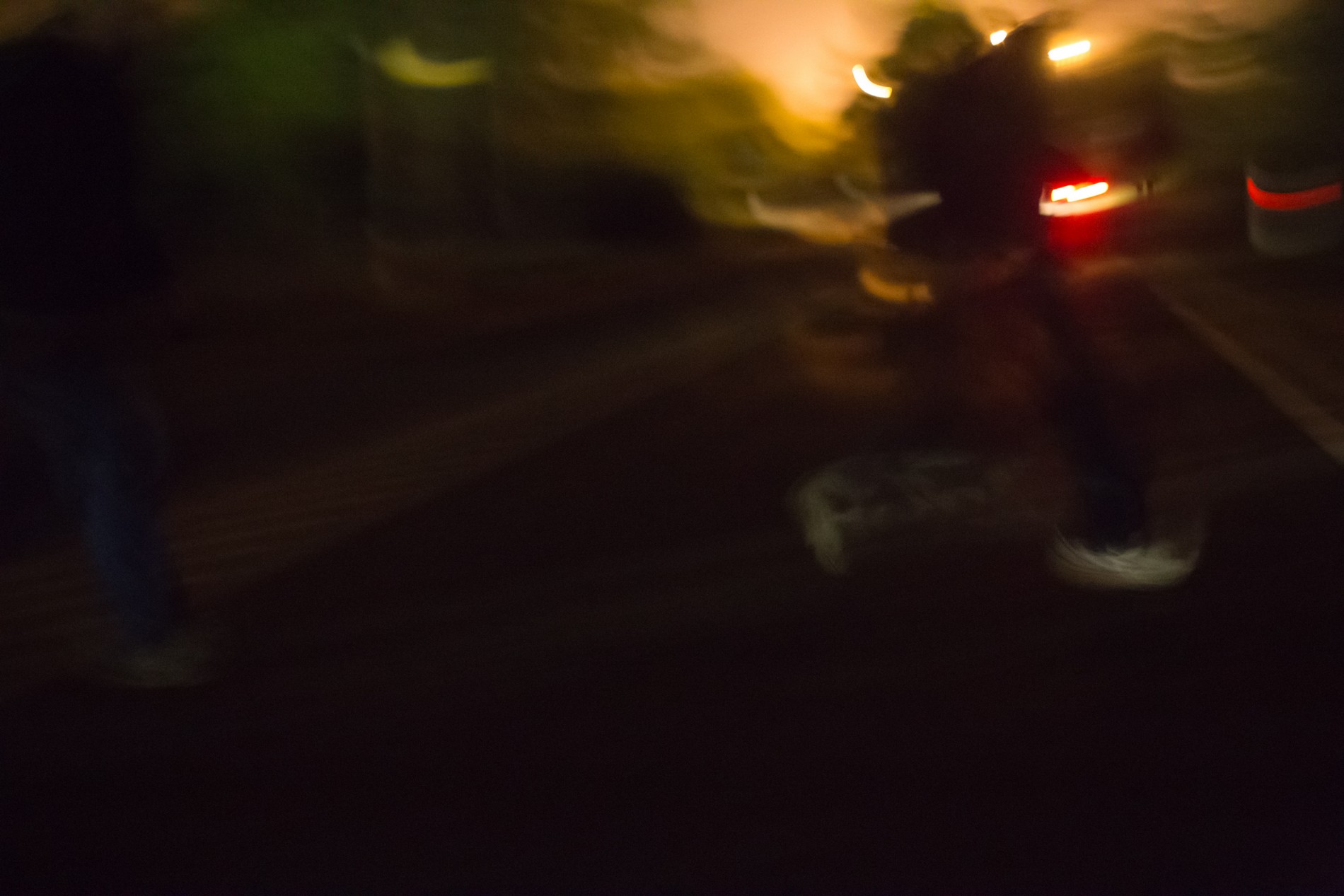
Kanjiza, the Refugee Camp
As I get close to the center, groups of refugees start to show up. A few young men, carrying only a little of their stuff – the „outskirts”. There’s a strong contrast between these people and the majority who come by bus, the remains of the Syrian cities’ middle class. These young men look perfect for labelling: no money for the tickets, revolving like satellites around a world of refugees, had such a world existed.
When the crisis started, they all came this way to Macedonia. There were no buses, weariness and sore feet leveled down differences, thirst and dehydration, any remaining hierarchy. As their numbers grew, transport companies and „the guys” figured out that their stereotypical thinking about the Syrian refugee was wrong, that he was not poor but was carrying good money in that small bag tightened around the hip.
The waves started coming in. In early March, there were 3, 4, sometimes 10 people in the park. By June, two hundred came in one day. Five hundred on June 5. The figures then spiraled and one could only talk of thousands. Local officials in South Serbia were overwhelmed and demanded the help of Government, Red Cross and the UN Refugee Agency. By August, the Agency spent 1 million euro for water, food, medicine, doctors and setting up refugee centres.
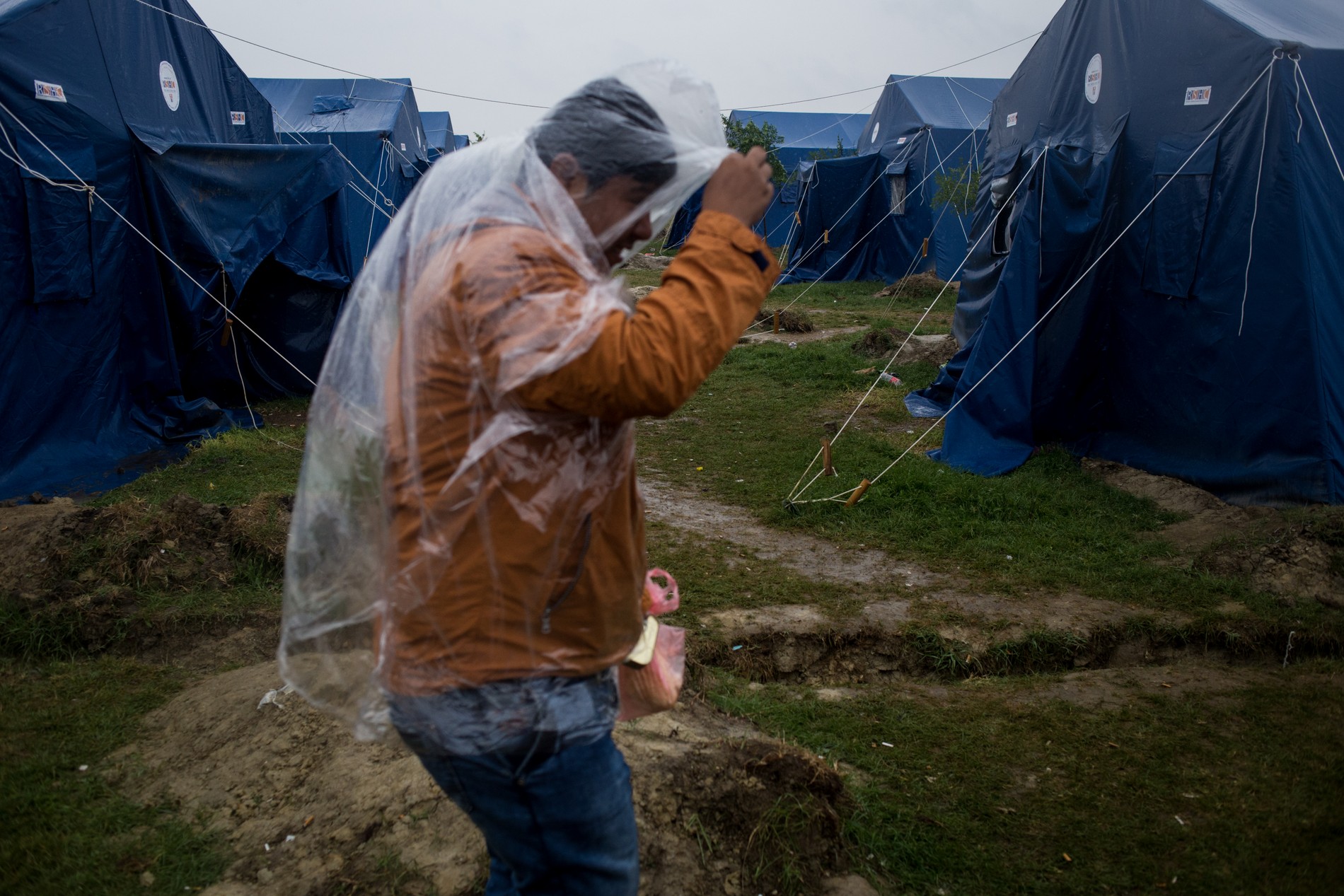
The bustle before the camp is similar to that I left 125 miles behind. Buses leave Belgrade, four hours later they download the people in Kanjiza and are quick to return. Between their arrivals, small buses make room for Hogros, where each is left to decide whether to cross the fields or the custom point where they are counted. I look through the open gates and missing fence pieces and think that the official figures are just estimates, the margin of error of which is impossible to figure out.
Mirjana Ivanovic-Milenkovski of the UNHCR Serbian office had told me in the morning that it might be possible that the number of transiting refugees be double the registered figures. Serbia counted 117,000 „official” refugees by September 10, but the government has the capacity to register as few as 1,600 people daily – the rest is estimates. Over 250,000 have come to Greece by sea, up to 3,000 others died in the Mediterranean.
Europeans quarrel over sharing some 160,000 people, while the United States and Australia contribute in an relatively insignificant manner, offering a hand to 10,000 and 13,000 respectively. Turkey alone still hosts 1.5-2 million of them and reports spending billions of dollars, while the crisis does not appear to overcome the early phases unless solutions are found.
Those left in Syria, Turkey, Lebanon or Iraq have no reason not to try to gain access to the living standards of the Western world, even when their lives are not threatened. It is possible they don’t have the money or often the education of those who are now crossing borders, a fact that may change many things in terms of transit management costs (and even more so hosting costs), as well as how these people are viewed, which is one of their main advantages in countries such as the UK, for example.
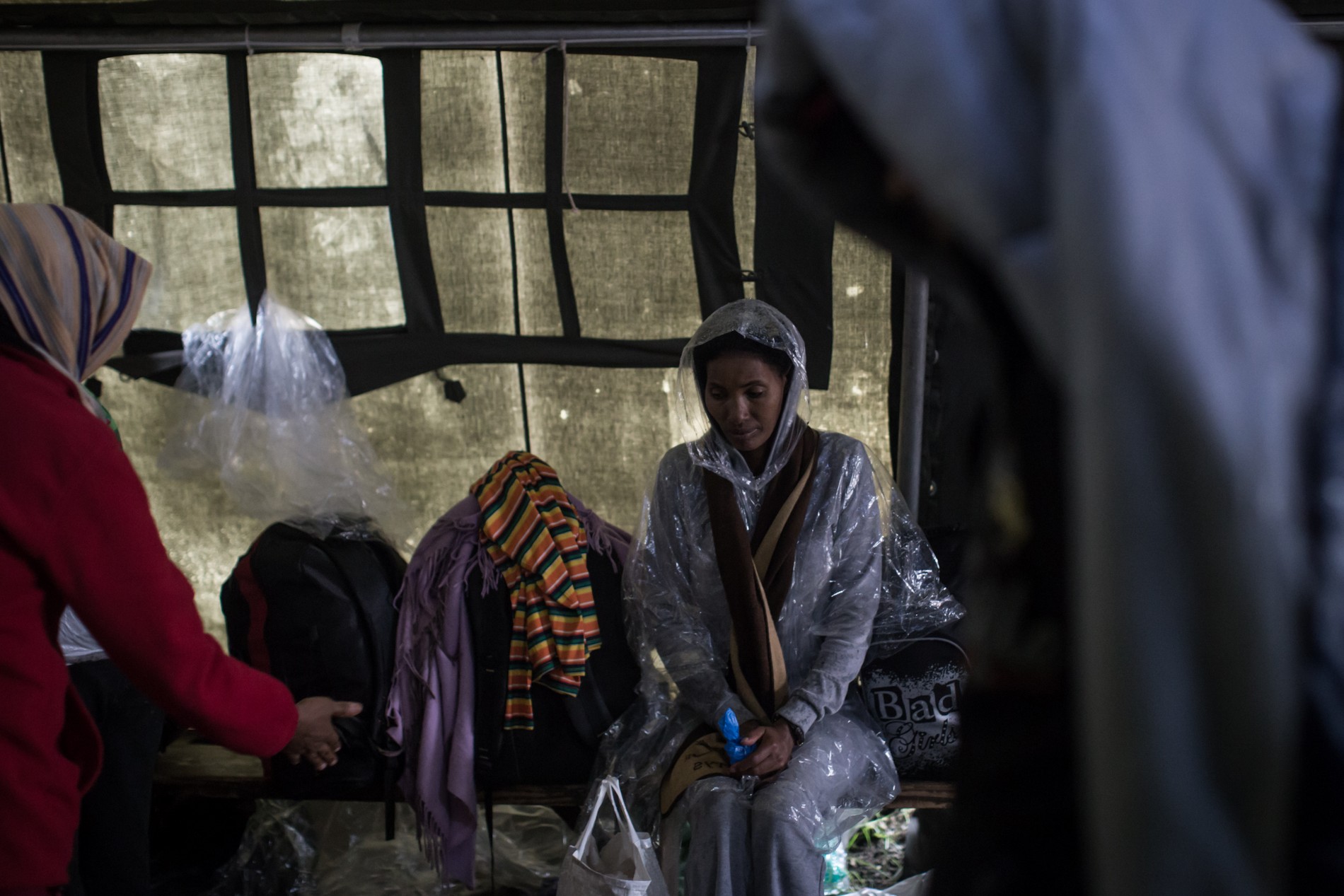
Back to the camp, the night falls fast. Buses come with lights on. Children make up short games between the moving of their parents, who group together, separate, find each other again somewhere else.
A teenage girl checks her phone. The dust before the centre settles for about 10 minutes before I smell it again in the air.
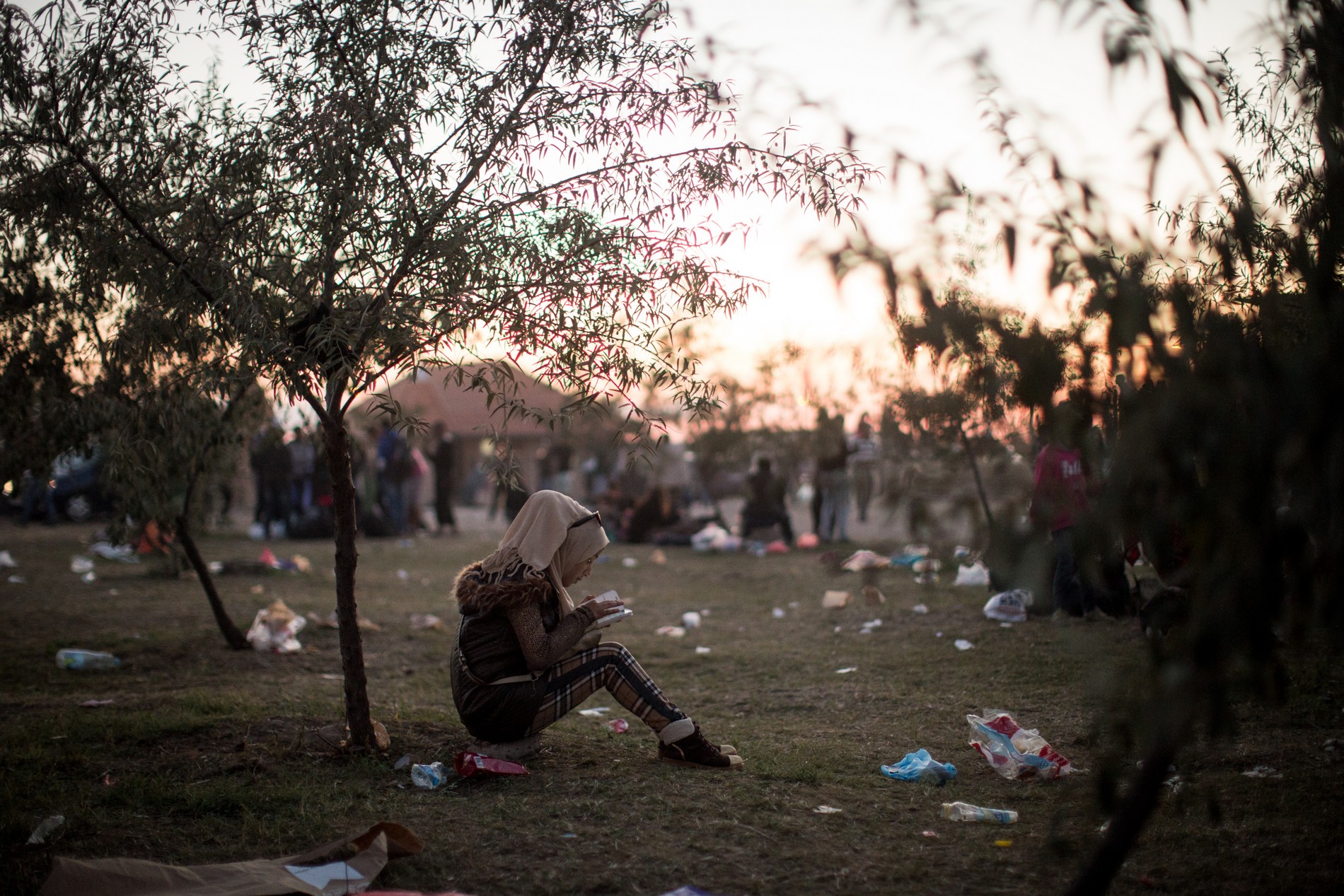

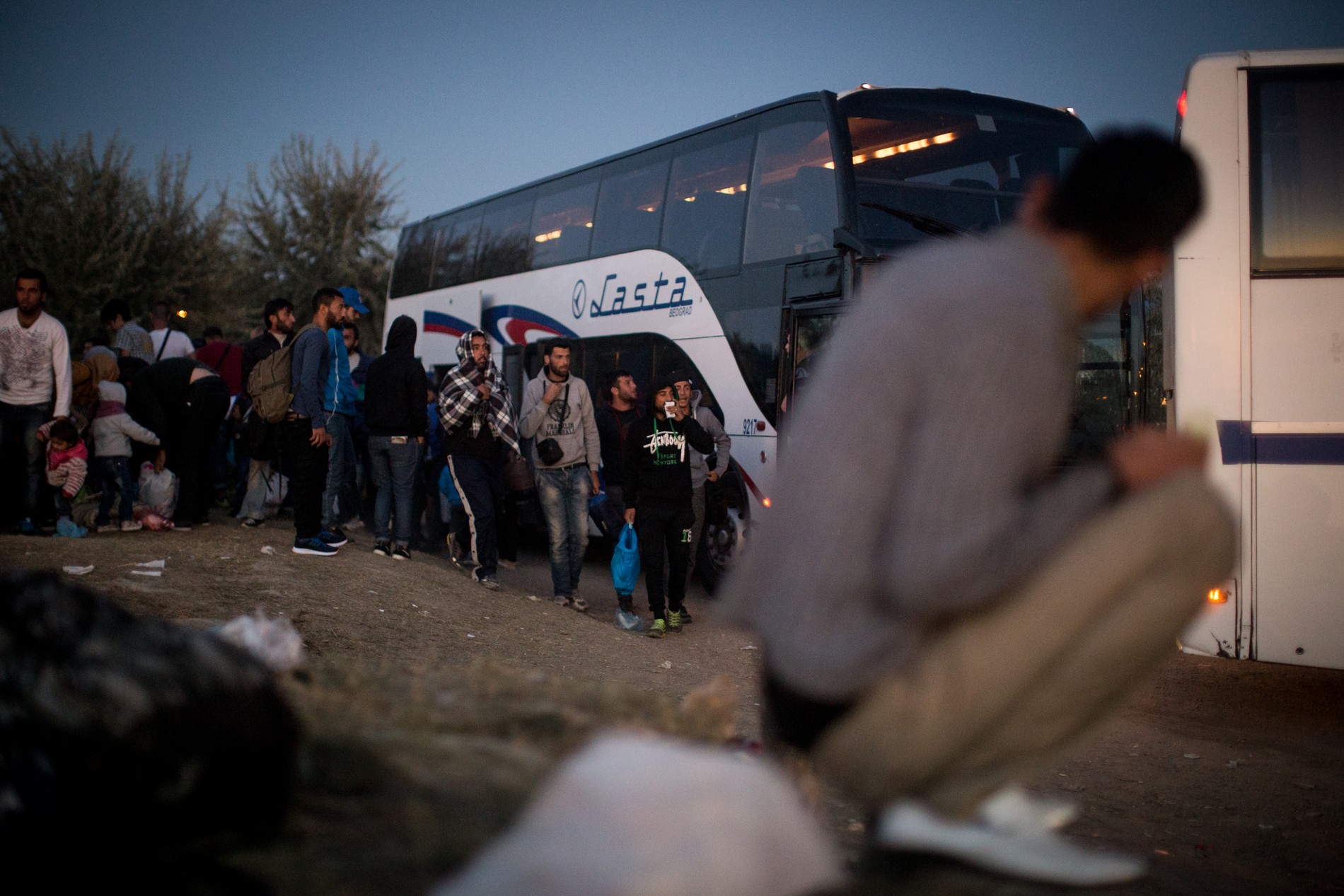
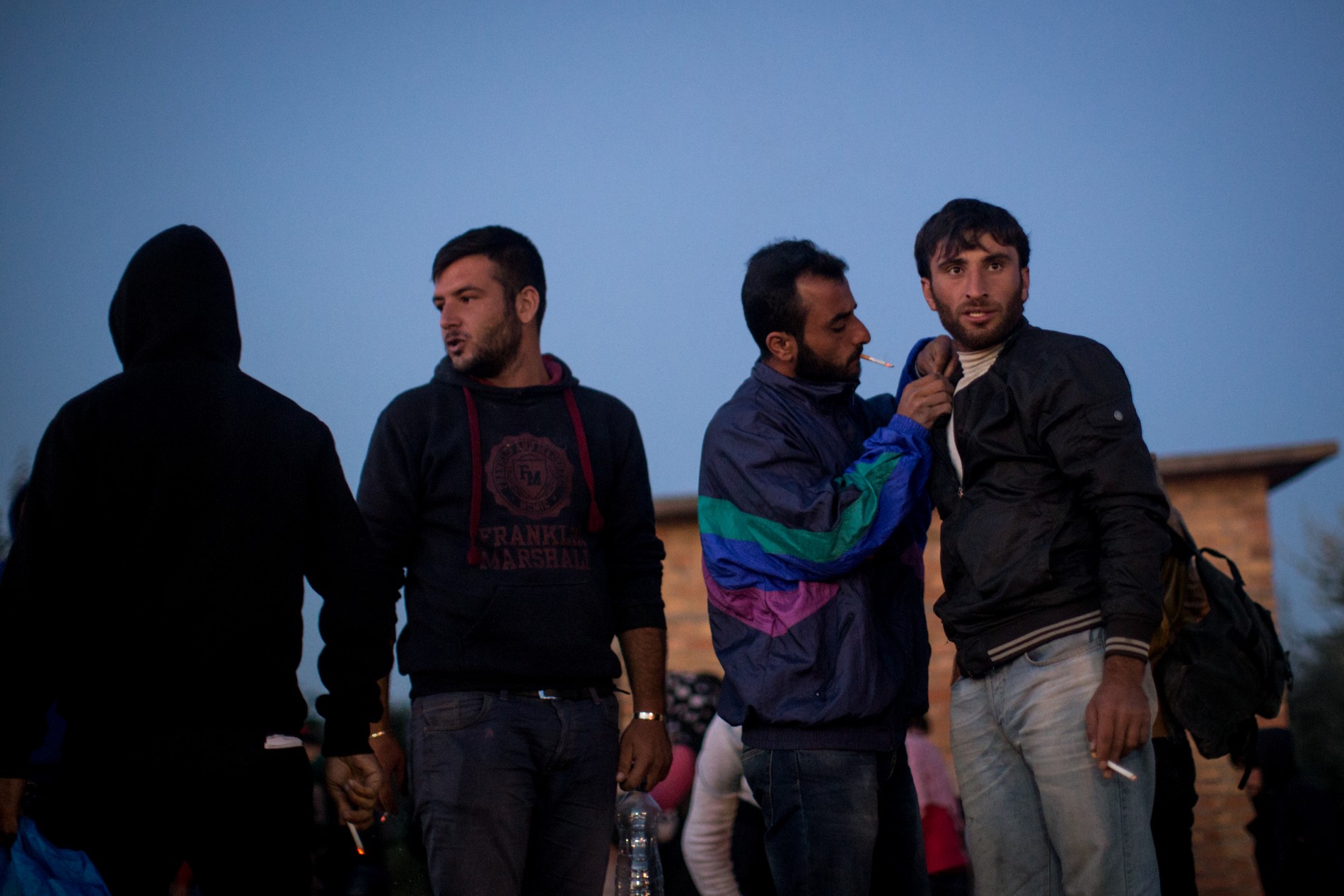
A new day and it drizzles. The dynamics of the centre looks different, as if it breathes in and breathes out every half an hour.
When buses come in, people enter tents and come out when ready to leave for the border. Raincoats are over – some have them already, others are completely unprepared. I see somebody from World Vision giving her scarf to a mother.
People try to find rest, charge up their phones and buy food from a trailer belonging to a city restaurant, parked outside the centre entrance.
Those who arrive when the cars of NGOs get here receive clothes, water and – sometimes – food. The majority of them leave in a couple of hours, others are staying.
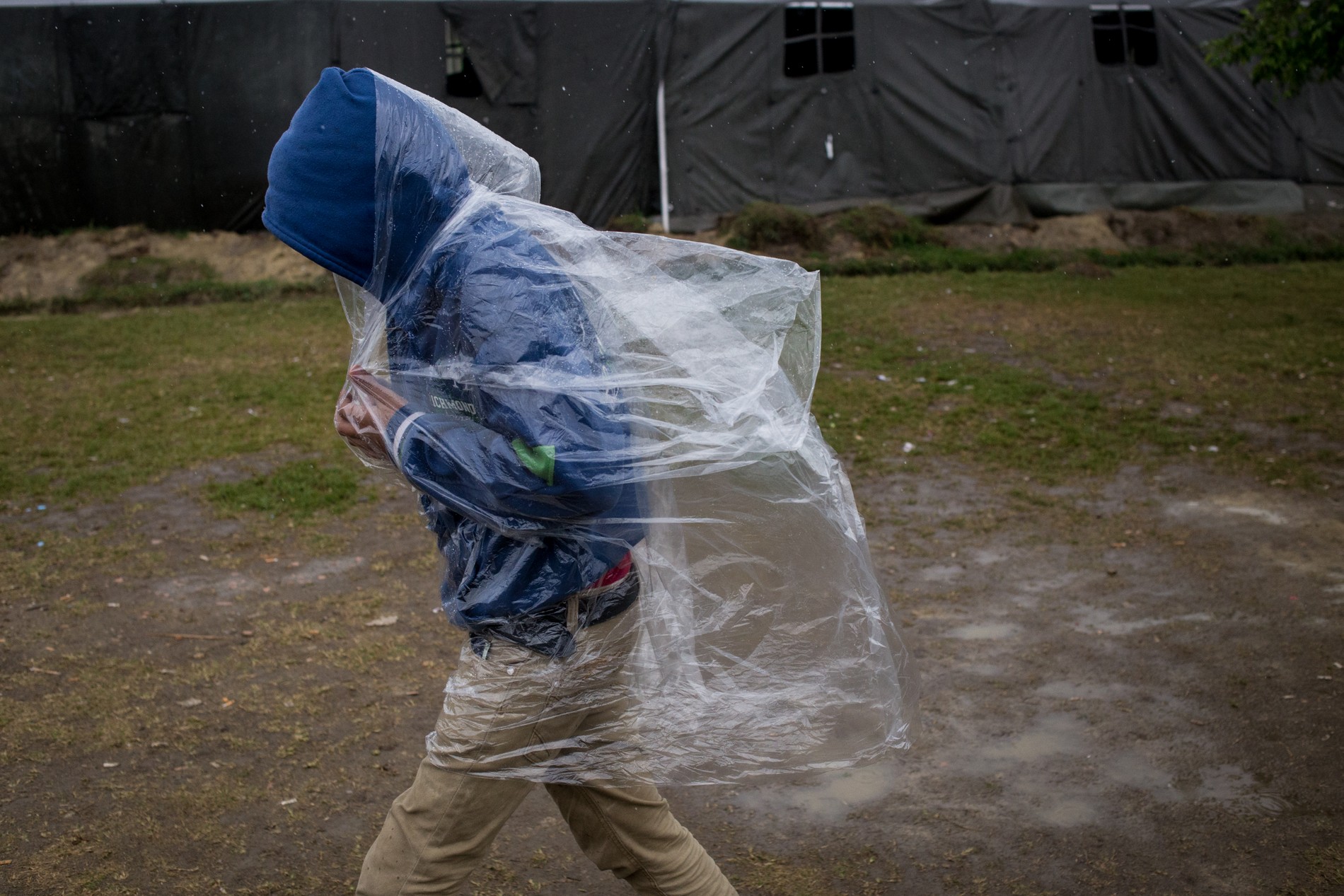
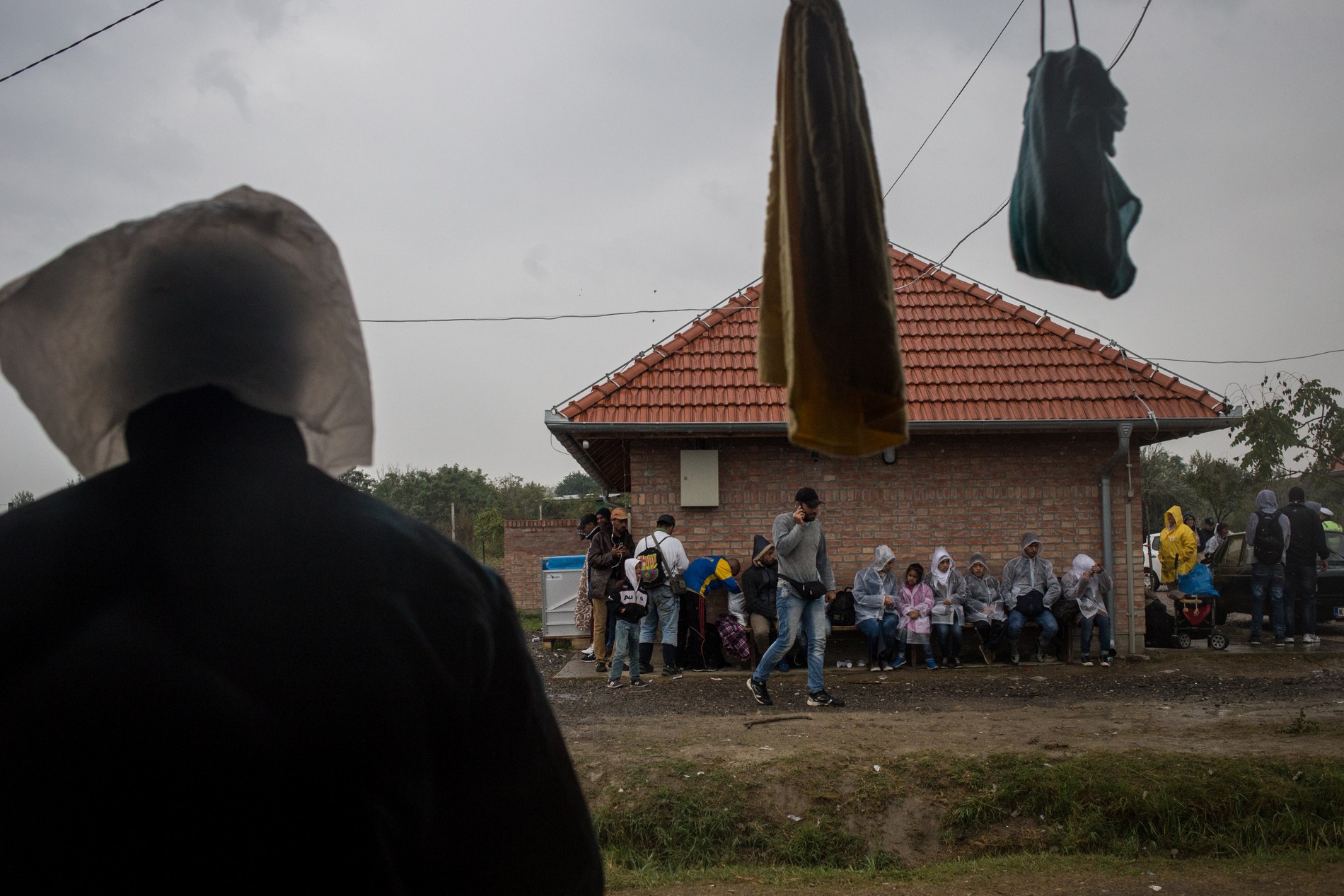
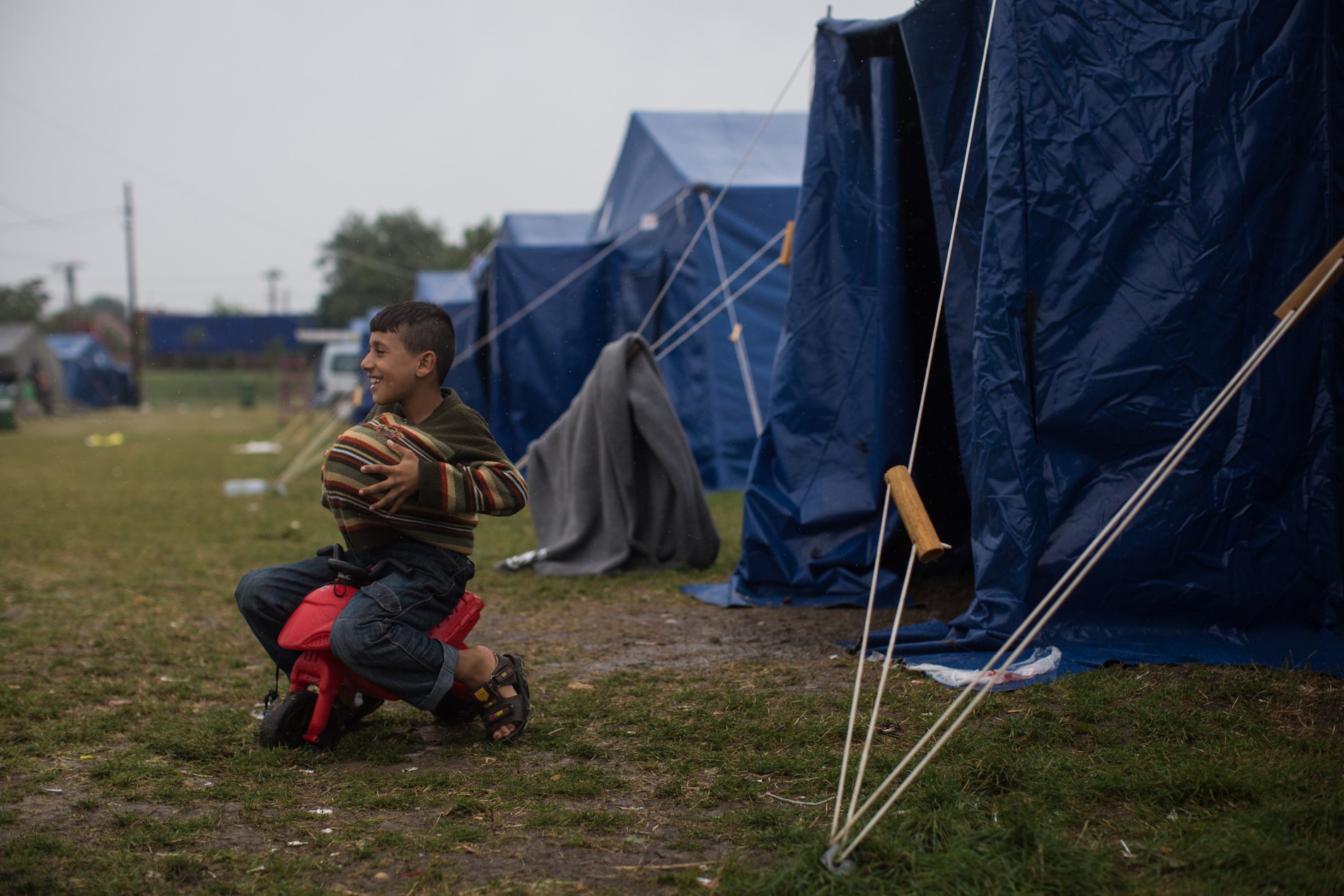 The pressure Serbia has felt especially when the crisis started, when things were even more confusing and unorganized, did not turn into fear and adversity. During the three days I spent among the refugees, I may have seen cautious reactions, but never hostile ones.
The pressure Serbia has felt especially when the crisis started, when things were even more confusing and unorganized, did not turn into fear and adversity. During the three days I spent among the refugees, I may have seen cautious reactions, but never hostile ones.
The government in Belgrade has contributed to the mood, with Prime Minister Vucic visiting the Kanjiza parks and the camp. In his speeches, you always hear key phrases such as „children feeling safe”, „we’ll do all we can to improve their living conditions”, „humanity, solidarity, tolerance”.
People asked him to give them blankets to help them cross the barbed wire fence at the border, which made him utter: „this is unthinkable for the 21 century”.
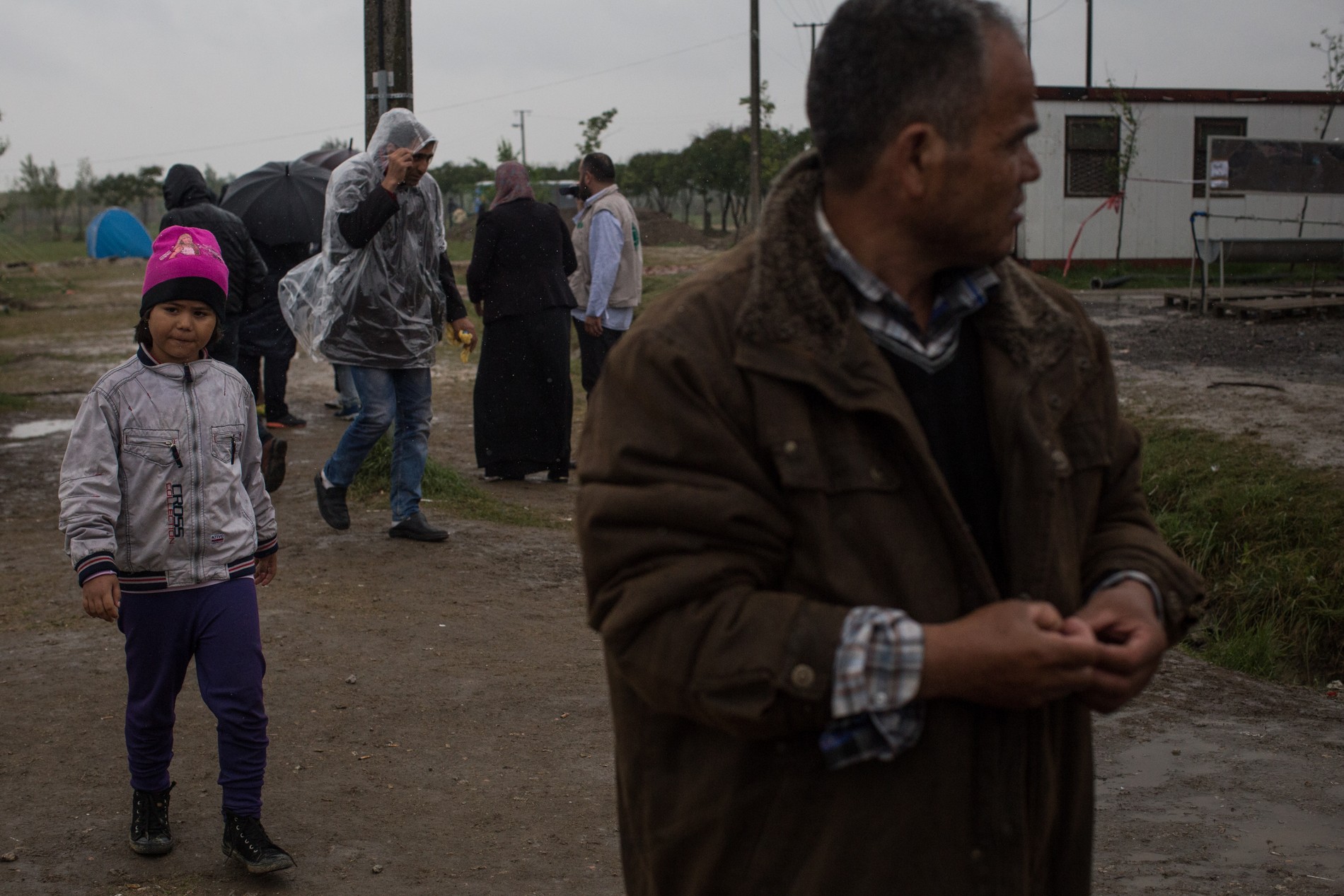 For the refugees, Serbia is the last stop on „allied” territory before they explore the uncertain fields of Hungary. But if refugees find it harder to go north, the pressure will be a lot higher on the transit countries of Serbia, Macedonia, Greece and Italy.
For the refugees, Serbia is the last stop on „allied” territory before they explore the uncertain fields of Hungary. But if refugees find it harder to go north, the pressure will be a lot higher on the transit countries of Serbia, Macedonia, Greece and Italy.
The other countries make their choice now – should they help or not? The public opinion in the Czech Republic, Slovakia and Poland already perceives the phenomenon as a migration, not as humanitarian help, as public protests are organised there „just in case”.
Bulgaria and Romania appear to share the same attitude as they worry for the spending with increased border police – not our problem, not for us to hop in, or at least give us something in return. The Austrian chancellor joins the refugee-supporting West and calls for sanctions on countries that fail to comply with imposed quota.
This may be of huge importance in a matter of time as valves are needed for the pressure everybody fears. Germany now receives its fix of educated people who could no longer cope with living conditions in Syria – it remains to be seen what it will do if the profile of those crossing the borders changes.
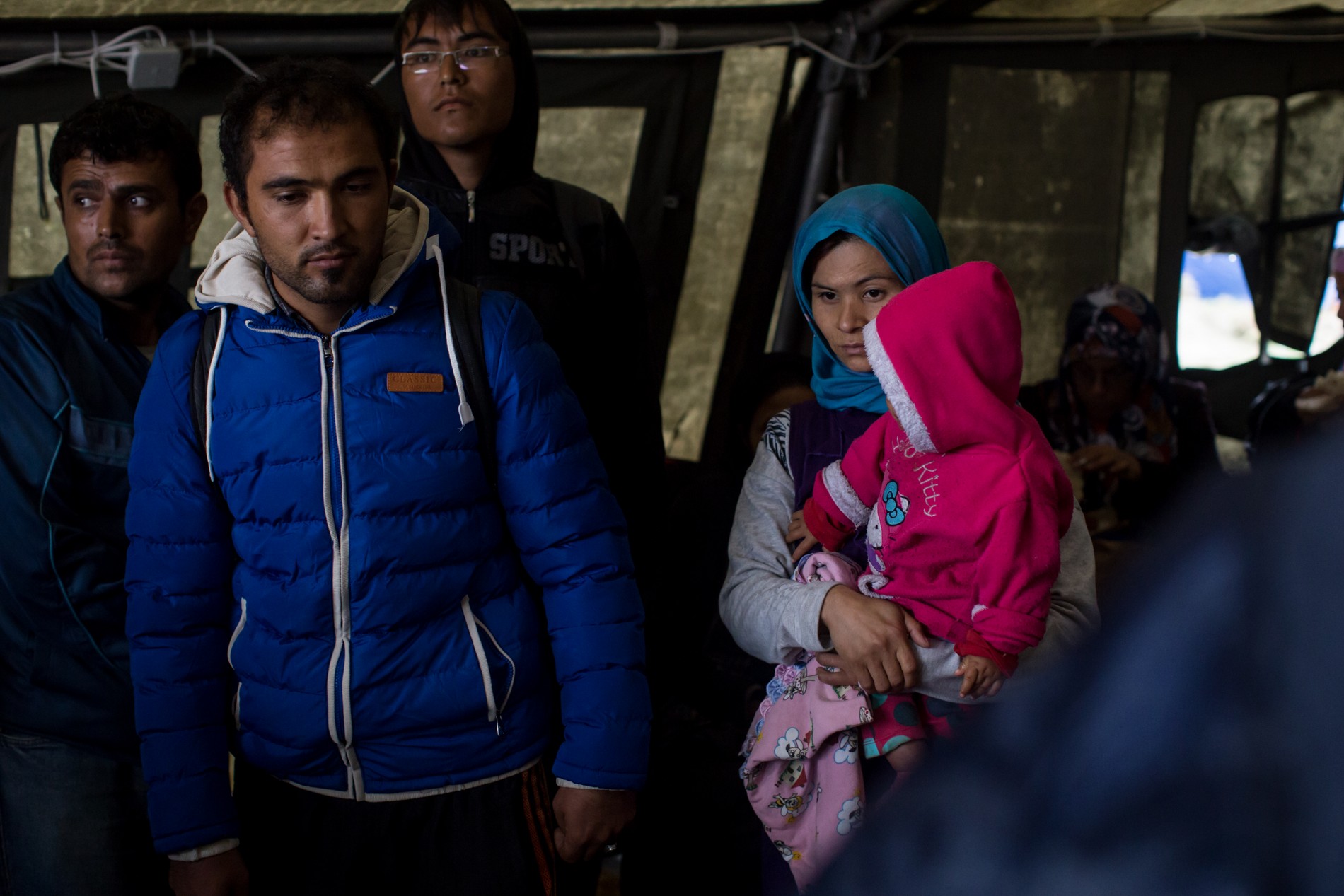
* With thanks for UNHCR Serbia and Romania for their information and assistance.
For those interested in statistics: http://data.unhcr.org/mediterranean/regional.php
 INTERVIURILE HotNews.ro
INTERVIURILE HotNews.ro





